
Top 10 Strategies For Catching Up on Missed Schoolwork and Ending The Year Successfully
It’s that time of year when many of the sessions in my private practice involves a discussion with my child or teen clients about strategizing ways to catch up a long list of missed assignments and end the school year successfully.
As a child psychologist and Modern Parenting Expert, I’ve unfortunately seen this scenario play out with many of my clients every year and it breaks my heart. It makes sense that many kids find themselves overwhelmed by late work in the second half of the school year. The first half of the year takes off slowly, allowing the child or teen to ease on in to homework, projects, and the material. Then, Christmas break happens and the child gets used to a slower pace for a while, and then January hits with a BANG!
Teachers mean business after the holidays are over. There is no more easing into the material and work, and the expectations are very high when it comes to producing work. In addition to this less-understanding attitude of the teacher, the academic material naturally becomes more complex and intense too. This scenario oftentimes creates a situation where it becomes very easy for kids and teens of become overwhelmed by the new demands of the second half of the school year.
But I have good news for you: even if your child is SUPER behind in their schoolwork, they can still end the school year on a positive note (and pass all of their classes!) by using the 10 strategies below. These are the same exact strategies that I use with all of my private practice clients, and I’ve seen many families rejoice with relief at the end of the year when their child brings home their well-deserved good grades.
The Strategies
Strategy #1: If you haven’t already, talk to your child’s teacher(s) to get an accurate accounting of the missed assignments and ask for extra time to get these assignments turned in.
For younger kids, the parent definitely needs to take control of this. Kids who are in elementary, middle school, and junior high just don’t have the communication skills necessary to have this important conversation with their teacher(s) and then report accurately back to mom and dad. Do yourself a favor, and take charge of this conversation yourself.
For kids who are in high school, these older kids can be encouraged to have this discussion on their own; however, if your child has a history of procrastination, lying, or academic anxiety, then it is probably better than you get involved in this conversation as well.
The point of this conversation is to get an accurate accounting of what assignments are actually missing. I know that when both my kids were in school, the online grading programs were not always accurate (we used Aries), so talking to the teacher(s) is the only way to ensure that you are getting an accurate idea of the amount of work that needs to be made up.
In addition to discussing which assignments are due, also see if the teacher is on board with your child turning in the assignments late. I’ve found that most teachers (even the grumpy ones) would rather a student turn in their work late than not at all, so most teachers will work with you on a new timeline for missing work.
Strategy #2: Make a realistic weekday AND weekend plan for completing missing assignments.
Now that you know exactly what you child is up against, sit down with them and create a realistic plan for getting it all done. What does realistic mean? It means that both you and your child need to come to terms with the fact that this won’t get fixed overnight. This will take time.
I recommend starting off slow because most kids at this point are so overwhelmed with the idea of making up so much work, that they need to first see that they are capable of tackling this big task. Many parents (and sometimes kids) want to start off by planning that the child or teen will spend all of their free time on homework.
This is just setting your child up for failure.
Look at your list of missing assignments and due dates. Plan to have your child work on 2-4 missing assignments per day on the weekday and more on the weekend (depedning on weekend family activities). Don’t expect your child to complete more that this even if they were able to complete 4 assignments in a half an hour and they have tons of time left in the day. Make a plan and stick to it. The point is to help your child see that they can take a problem, devise a solution, and work consistently on the solution successfully.
Especially with kids and teens who also experience anxiety, this step of the plan helps to manage the anxiety surrounding the missed work. When kids are using all of their cognitive capacity to worry about their academic work, they don’t have much cognitive energy left to actually work on their assignments. By creating a realistic plan, managing the anxiety surrounding the academic stress, and then plugging away every day at the plan, your child or teen will actually be able to work on their assignments more efficiently.
Strategy #3: Go For The Quick Win.
This step is counterintuitive to what most parents instinctively want to do. I’ve seen many parents set their child or teen up for failure when they encourage their child to work on hard assignments first, but this ALWAYS backfires.
For example, let’s say your plan is to have your teenager tackle 3 missing assignments per day and you tell your child to work on a science report that is worth a lot of points as 1 of their assignments for the day. More than likely, this assignment takes a long time to complete because it is really involved. Many kids and teens get discouraged at this point because they don’t see the plan working.
Instead of going for those larger projects first (and I totally understand the reasoning behind why you would want them to start with these projects) start with the “easy wins” first. Choose short assignments, Or assignments in the classes that your child likes or finds easier than other classes.
The point here is to allow your child to experience progress and success. If they see the plan working, then they are more likely to continue with the plan and have a better attitude about working on their missing assignments.
Strategy #4: Create a New Habit Routine – And Don’t Forget The Reward Phase.
Scientific research shows us that creating a “Habit Loop” is the best way of establishing – and keeping – positive behavior patterns. The image below illustrates Charles Duhigg’s Habit Loop. A new behavior needs a reminder (like a particular time of the day) which influences the desired behavior. In order to keep the habit going, the subject must experience some kind of reward after performing the behavior such as some well-earned video game time, the ability to facetime a friend, etc.

Most of the time, I recommend that the reward be something that the child likes to do in their down time.
For more on the Habit Loop, check out THIS ARTICLE on my Parenting The Modern Family blog .
Strategy #5: Take Care of HALTS Before Starting Homework.
It’s hard for anyone to concentrate if they are Hungry, Angry, Lonely, Tired, or Stressed; as such, be sure these common discomforts are addressed. I always recommend that kids should have a snack before starting homework – and research backs me up here. A healthy and quick snack increases their glucose level (the energy needed for your child’s brain to function well), so ensuring they are not hungry goes a long way in helping them get their missing assignments done.
If your child or teen seems angry – or bothered by any other negative emotion – then allow them to deal with that emotion. For example, if your child is angry that they need to do homework instead of play outside with their friends, allow them to talk about their anger and then have a positive discussion with them that they can play with their friend as soon as their homework for the day is finished. If you allow your child to “push down” their emotions, then they’ll just sit there giving cognitive energy to their emotions instead of their homework.
Likewise, if your child is lonely, offer to sit with them while they work – or have the family dog or cat keep them company. If they are tired, re-evaluate their bedtime. Maybe they need to go to bed a half hour earlier. And if they are stressed about their homework, help them decrease their stress levels by using this technique .
As you can see, taking care of your child or teen’s physical and emotional needs goes a long way in meeting the goal of catching up with their missed assignments.
Strategy #6: Consider Pausing Extracurriculars For a While.
If your child or teen has a long list of work that needs to be made up, it might make sense to pause their extracurricular activities. This really isn’t meant to be a punishment per se, but it is a natural consequence of taking care of major responsibilities first. You know your child and the situation regarding their extracurriculars best, so if it makes sense to “pause” their extracurriculars, then go ahead and do so.
Strategy #7: Deal With The Overwhelm.
Dealing with overwhelm is a life skill that most kids haven’t learned yet. Yes – this is a LEARNED SKILL.
It can be very frustrating working with a child or teen who only focus on the goal (getting all the missing assignments completed) and not the small steps in attaining that goal (working on one task at a time). Many young clients sit in my office and focus only on the overwhelming idea of a mountain of work that must be done. When I begin working with them about developing a plan to address their missing work, they shut down and can’t seem to even concentrate on thinking of a plan. They tell me, “That will never work – I have too much to do,” and I have to remind them, “Yes, but you can’t do it all at once. You can only do one task at a time, so which task should you concentrate on first?”.
When your child starts “spiraling” at the thought of so much work that needs to be done, bring them back to reality by reminding them that they can’t do every task right now. Ask them to choose only 1 task to think about (and try to make it a quick win – see strategy #3 above).
Strategy # 8: Get Educational Support For Your Child.
Many kids ignore assignments because they are too difficult for them. Every child has their own unique strengths and weaknesses, which means that most kids won’t be great at every class. If your child is struggling with a particular subject (especially in the last half of the year when the subject matter becomes more complex and difficult) then consider a tutor.
Now, a tutor can mean several things. One type of tutor is someone who has been trained in education and makes a living helping kids overcome their educational struggles. This can be very expensive though. I often ask parents if they have a teenage or college-age person in the family who might be able to come and work with the child for a short period of time. Older kids often like mentoring younger family members. Not only is this a cheaper alternative, but I’ve seen this situation really be effective.
If you need to, get creative with looking for someone to act as a tutor for your child.
Strategy #9: Remember To Take Breaks.
Adults have learned to “power through” things, but kids and most teens still have not developed this life skill yet. Because of this, they will need to take frequent breaks when working on long session of homework. I recommend that kids and teens should take a break every 45 minutes, take a 10-15 minute break, and then get back to work again.
A great technique is the pomodoro method, and this method has some scientific backing that it is very useful. All you have to do is set a timer (there are even tons of pomodoro apps for your phone!) for 45 minutes. When the timer goes off, let your child take a break. They can look at their phones, watch a short Youtube video, go to the bathroom, etc. Set the timer for again for the break time (10 or 15 minutes). When the timer goes off again, that’s the signal that it’s back to work. Set the timer again for 45 minutes and repeat.
You can even challenge your child or teen to work through several pomodoro sessions. This method works well because the timer never lies, and the child learns to take their cues from the sound of the timer.
Strategy #10: Contact a Child Therapist To Help Your Child Work Through Difficult Feelings That Are Holding Them Back From Achieving Their True Potential.
There’s nothing I hate more than seeing kids or teens not living up to their full potential, but this happens a lot when they are also dealing with feelings of anxiety, depression, low self-esteem, or difficulties with concentration (such as ADHD). The only way for your child or teen to move past these feelings that are sidelining them is to deal with them in therapy.
In my private practice, I am passionate about helping kids reach their goals. As a child psychologist and Modern Parenting Expert, I have specific training in helping kids overcome obstacles that are common to this generation of young people. I have helped kids and teens overcome problems with motivation, low self-esteem, anxiety, depression, and many other issues.
Call (909) 326-2562 today to schedule a free 20-minute phone consultation to see if I am a good fit in working with your child. Or click here to use my online scheduler to schedule the phone consultation today.
Your child or teen CAN overcome any obstacle with the right support!
[grwebform url=”https://app.getresponse.com/view_webform_v2.js?u=Sa7o&webforms_id=28316204″ css=”on” center=”off” center_margin=”200″/]


Why it’s hard for students to “just turn in” missing assignments, and how to get them unstuck
Mar 29, 2023 | Blog

With the end of the semester on the horizon, many students may feel overwhelmed by low grades or feeling behind in some of their classes.
As a parent, it can be stressful to see that your student has overdue work, or get notifications from their teacher that they’re missing assignments.
It’s even more frustrating when you’ve told them over and over again how important it is to “just turn it in”…but the work is still showing up as missing.
The reality is that no matter how simple it might seem to an outside observer, doing missing work is almost never as easy as “just getting it done.” If they haven’t done the work yet, there’s a good chance that something is getting in their way.
If you can figure out what the problem is before jumping in to help them (or make them) do the work, you’ll dramatically increase your chances of success.
In our experience, there are usually 3 main reasons students resist submitting their missing work…even when it seems like “just turning it in” would be SO much easier!
Reason 1: They think it won’t make a difference
Once the due date for an assignment has passed, students often de-prioritize it and move on to focus on upcoming assignments instead. It’s tempting for students to justify this by thinking “there are lots of other assignments, missing one or two won’t matter.”
But what they often don’t realize is that because of the way most grading scales are weighted, even one or two zeros can have an enormous impact on their grade. Showing students the difference it makes to turn in just a few assignments can increase their motivation to get the work done.
Here’s an example of the difference it can make to turn in just a few missing assignments before the end of the semester:
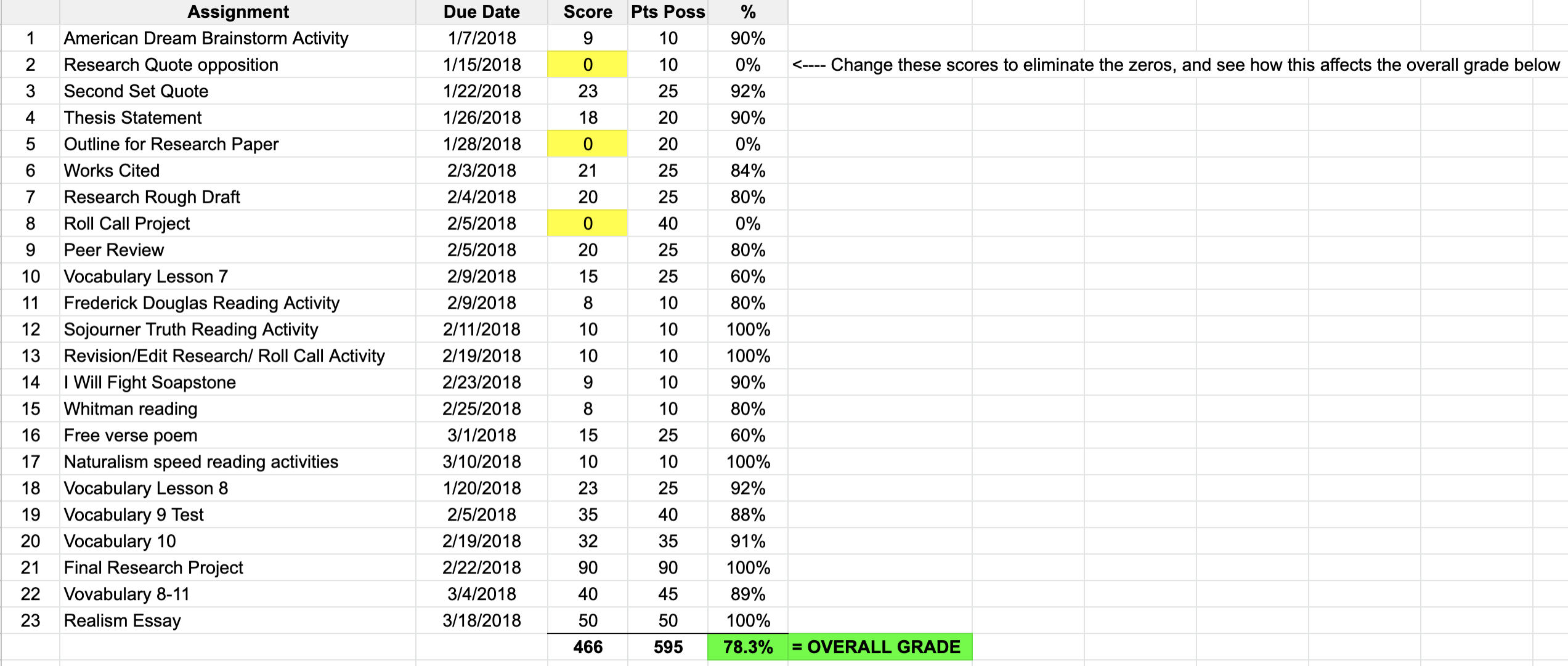
Overall grade with 3 missing assignments: 78.3%
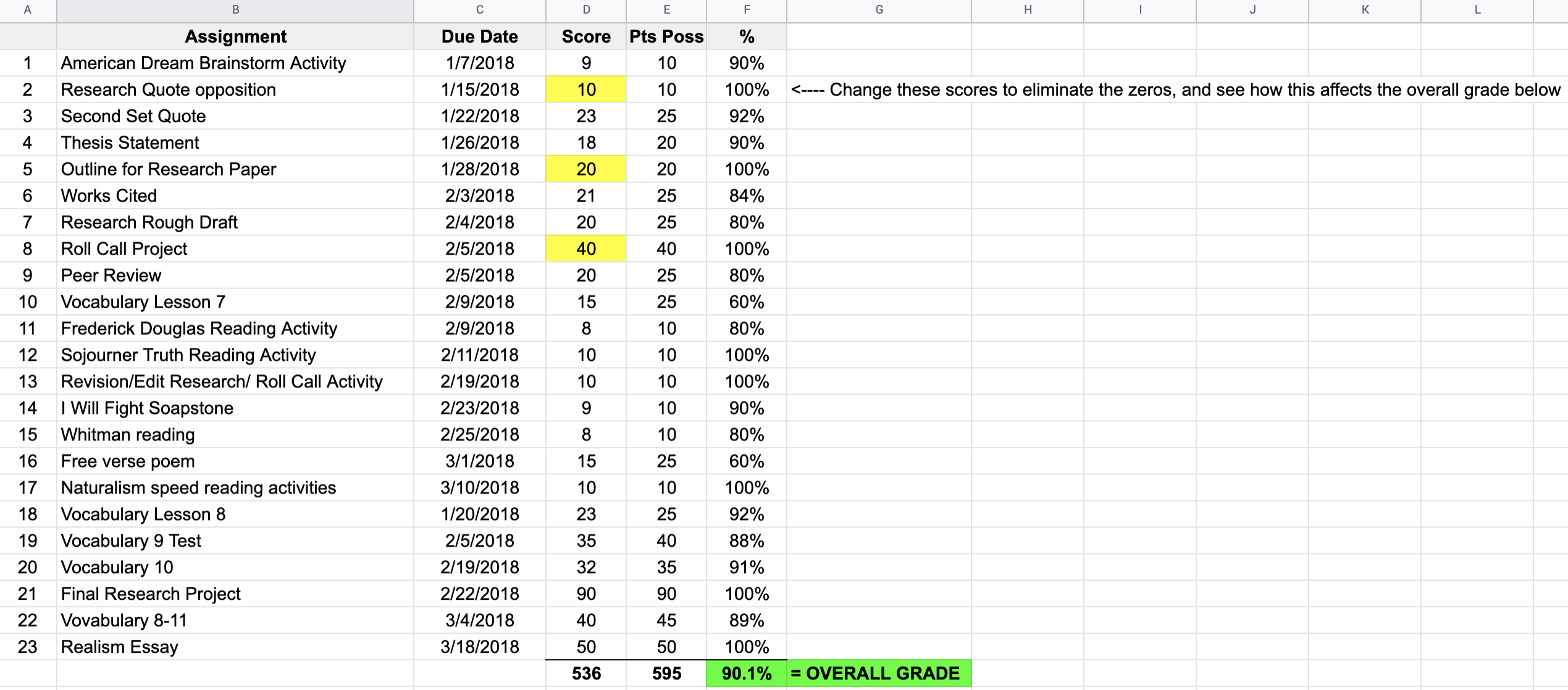
Overall grade when assignments are turned in: 90.1%
It’s hard for students to calculate these averages in their head, so it can be really powerful for them to run the numbers and see firsthand exactly how much they have to gain from making up their missing assignments.
When we do calculations like this with our students, they are almost always surprised by how much this makeup work could improve their grades, and feel much more motivated to submit the assignments when they can see for themselves the difference it will make.
Reason 2: They think it’s too late
Another reason students often resist doing makeup work is that they think it’s too late to get credit for it.
Even if they’ve done the math and know that submitting the work would make a difference in their grade, they still won’t want to turn it in if they think the teacher won’t accept it.
Especially for introverted or anxious students, it can be very intimidating to have conversations with their teachers. They might think they’ll get in trouble for asking to submit their work late, or worry that the teacher will say “no.”
The good news is that many teachers are flexible with their late work policies and allow students to turn in overdue assignments even when it is past the “official” deadline to submit them.
So if students can find the courage to ask for help, there is a good chance that their teachers will respond positively and allow them an opportunity to make up the work.
For students who are struggling to reach out to teachers, we often find it is helpful to roleplay these conversations in coaching sessions if they’re not sure what to say, or work with them to email their teachers if they’re not sure what to say.
Reason 3: They feel overwhelmed
Students who are behind on their work often have challenges keeping track of due dates, managing time, breaking down complex assignments, prioritizing work, staying focused, or following through with plans….which is why they fell behind in the first place.
These challenges can become even more daunting when they are behind in their classes, and trying to complete makeup assignments on top of their normal workload.
This can feel so stressful that a lot of students avoid or put off doing makeup work even when they know how much it would improve their grade.

For these students to get their work submitted, it’s essential to help them find ways to…
- Break down the assignments so they have a realistic plan for getting the work done that they’re confident they can actually follow through with
- Lower the stress they feel while they are doing the work so they will be less tempted to avoid it
- Visualize the progress they are making so they can see that their efforts are making a difference
Providing support
When students have a lot of makeup work to complete, having some additional support to help them work through it can be invaluable.
For some students, this may mean finding a tutor to help them with the content they didn’t understand when their teacher was first presenting the material.
For other students, having a family member or friend nearby as a source of moral support to keep them company while they are working (and a motivating reward to look forward to as soon as the work is completed) can be enormously helpful.
Other students may benefit from working with an academic coach to help them get unstuck and started on their missing work. Sometimes, having someone else who is not a family member step in to help can reduce stress and conflict at home and make it easier for students to take the steps they need to get back on track in their classes. If you think this type of support would be helpful for your student, please feel free to reach out and we’ll be happy to help!

Enter your email to unlock an extra $25 off an SAT or ACT program!
By submitting my email address. i certify that i am 13 years of age or older, agree to recieve marketing email messages from the princeton review, and agree to terms of use., 8 easy ways to finish your homework faster.

How many times have you found yourself still staring at your textbook around midnight (or later!) even when you started your homework hours earlier? Those lost hours could be explained by Parkinson’s Law, which states, “Work expands to fill the time available for its completion.” In other words, if you give yourself all night to memorize those geometry formulas for your quiz tomorrow, you’ll inevitably find that a 30 minute task has somehow filled your entire evening.
We know that you have more homework than ever. But even with lots and lots to do, a few tweaks to your study routine could help you spend less time getting more accomplished. Here are 8 steps to make Parkinson’s Law work to your advantage:
1. Make a list
This should be a list of everything that has to be done that evening. And we mean, everything—from re-reading notes from this morning’s history class to quizzing yourself on Spanish vocabulary.
2. Estimate the time needed for each item on your list
You can be a little ruthless here. However long you think a task will take, try shaving off 5 or 10 minutes. But, be realistic. You won’t magically become a speed reader.
Free SAT Practice Tests & Events
Evaluate and improve your SAT score.
3. Gather all your gear
Collect EVERYTHING you will need for the homework you are working on (like your laptop for writing assignments and pencils for problem sets). Getting up for supplies takes you off course and makes it that much harder to get back to your homework.
The constant blings and beeps from your devices can make it impossible to focus on what you are working on. Switch off or silence your phones and tablets, or leave them in another room until it’s time to take a tech break.
Read More: How to Calculate Your GPA
5. Time yourself
Noting how much time something actually takes will help you estimate better and plan your next study session.
6. Stay on task
If you’re fact checking online, it can be so easy to surf on over to a completely unrelated site. A better strategy is to note what information you need to find online, and do it all at once at the end of the study session.
7. Take plenty of breaks
Most of us need a break between subjects or to break up long stretches of studying. Active breaks are a great way to keep your energy up. Tech breaks can be an awesome way to combat the fear of missing out that might strike while you are buried in your work, but they also tend to stretch much longer than originally intended. Stick to a break schedule of 10 minutes or so.
8. Reward yourself!
Finish early? If you had allocated 30 minutes for reading a biology chapter and it only took 20, you can apply those extra 10 minutes to a short break—or just move on to your next task. If you stay on track, you might breeze through your work quickly enough to catch up on some Netflix.
Our best piece of advice? Keep at it. The more you use this system, the easier it will become. You’ll be surprised by how much time you can shave off homework just by focusing and committing to a distraction-free study plan.
Stuck on homework?
Try an online tutoring session with one of our experts, and get homework help in 40+ subjects.
Try a Free Session

Explore Colleges For You
Connect with our featured colleges to find schools that both match your interests and are looking for students like you.

Career Quiz
Take our short quiz to learn which is the right career for you.

Get Started on Athletic Scholarships & Recruiting!
Join athletes who were discovered, recruited & often received scholarships after connecting with NCSA's 42,000 strong network of coaches.

Best 389 Colleges
165,000 students rate everything from their professors to their campus social scene.
SAT Prep Courses
1400+ course, act prep courses, free sat practice test & events, 1-800-2review, free digital sat prep try our self-paced plus program - for free, get a 14 day trial.

Free MCAT Practice Test
I already know my score.

MCAT Self-Paced 14-Day Free Trial

Enrollment Advisor
1-800-2REVIEW (800-273-8439) ext. 1
1-877-LEARN-30
Mon-Fri 9AM-10PM ET
Sat-Sun 9AM-8PM ET
Student Support
1-800-2REVIEW (800-273-8439) ext. 2
Mon-Fri 9AM-9PM ET
Sat-Sun 8:30AM-5PM ET
Partnerships
- Teach or Tutor for Us
College Readiness
International
Advertising
Affiliate/Other
- Enrollment Terms & Conditions
- Accessibility
- Cigna Medical Transparency in Coverage
Register Book
Local Offices: Mon-Fri 9AM-6PM
- SAT Subject Tests
Academic Subjects
- Social Studies
Find the Right College
- College Rankings
- College Advice
- Applying to College
- Financial Aid
School & District Partnerships
- Professional Development
- Advice Articles
- Private Tutoring
- Mobile Apps
- International Offices
- Work for Us
- Affiliate Program
- Partner with Us
- Advertise with Us
- International Partnerships
- Our Guarantees
- Accessibility – Canada
Privacy Policy | CA Privacy Notice | Do Not Sell or Share My Personal Information | Your Opt-Out Rights | Terms of Use | Site Map
©2024 TPR Education IP Holdings, LLC. All Rights Reserved. The Princeton Review is not affiliated with Princeton University
TPR Education, LLC (doing business as “The Princeton Review”) is controlled by Primavera Holdings Limited, a firm owned by Chinese nationals with a principal place of business in Hong Kong, China.
Best Back to School Ideas 🍏

End the Unfinished Work Battle: Catch-Ups and Pickles
Share this post:.

Are your students struggling to complete their work? Up to your eyeballs in missing or unfinished work assignments? Then you might need to institute a “Catch-up and Pickles” routine in your classroom as a way to win the missing or incomplete work battle! This is seriously my favorite unfinished work routine!

A few weeks ago, I posted a Reel on Instagram about some of my more “controversial ” grading practices. Between you and me… they really aren’t that controversial… just good teaching! But folks LOST THEIR MINDS! And honestly, it shed light on a bigger problem: the struggle of incomplete work.
Controversial Grading Practices
You’re probably wondering what those controversial grading practices were. I’ll let you watch the IG Reel to see all three, but the one that had most teachers up in arms was the belief of not putting anything less than 50% in the grade book.
This one line led to me being called many things, but most teachers asked, “What about missing or incomplete work?”
To which I responded that I rarely struggled with incomplete or missing work. I can think of one time I had to put a zero in the grade book because of a missing assignment – ONCE – in 13 years of teaching. Those are some pretty good odds!

Unfinished Work Routine
So, how can this be?
First, let’s clear up some things:
- No – I didn’t have perfect students who completed every assignment without asking.
- No – I didn’t work at fancy schools with high volumes of parents involved who made sure the work was completed at home.
- And, no – I didn’t work myself to death chasing down students.
I rarely had missing or incomplete work because I planned time in my week for students to work on missing or incomplete assignments.
Today, I’m sharing this simple yet HIGHLY effective routine that basically eliminated the struggle to get students to complete missing or incomplete assignments.
This magical weekly routine that solves the missing work problem is fondly called, “ Catch-up and Pickles. ” But, that’s really just a fancy name for a time set aside on a Friday morning so students can work on unfinished work.
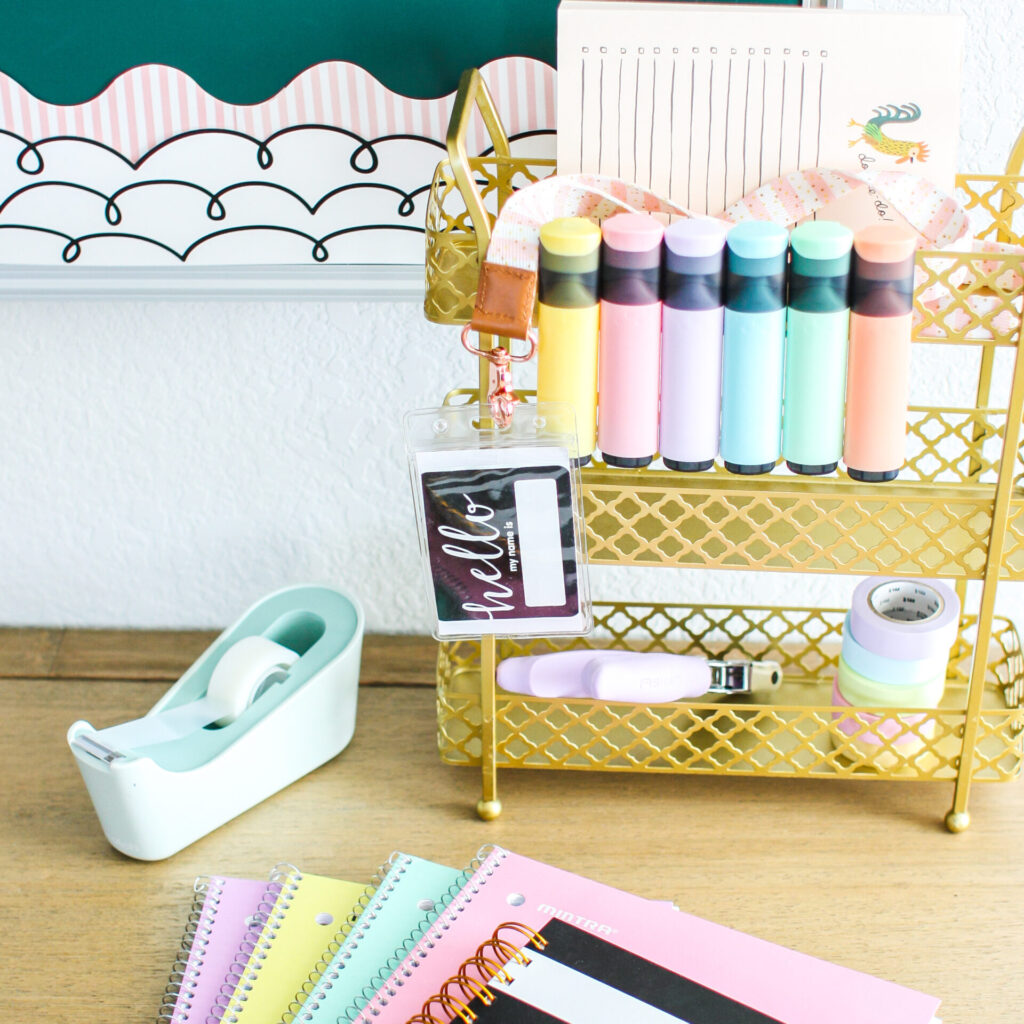
What is Catch-Up and Pickles?
I shared about this concept a while ago in my “Small Group Time Exposed” post , but I feel like after all the hoopla that Reel caused, it warranted its own place on the blog!
Each day, I had 60 minutes of time built into my schedule for small group rotations. That worked great Monday through Thursday. But, I noticed that Fridays were a bit cramped. Not only did we have our spelling and vocabulary test that day but we would also have a reading comprehension assessment. Time is needed to complete all these assessments, and that ate into a portion of our small group time.
Rather than try and stuff the small group instruction into the 30 minutes that were left after completing everything else, I decided to transform that awkward time slot into productive work time.
So at the end of the week, instead of formal center rotations, I did a “Catch-Ups and Pickles” routine. Students who had not finished their work used this time to “Catch-Up,” while those who were done were allowed to “Pickles” a reading-based activity to complete.
For students, this time was dedicated to completing their work or choosing a preferred activity to complete.
For the teacher, this routine provided time to reteach lessons, pull students for assessments , or conference with students one on one.
And let me just say… this was a wildly popular time in my classroom!
How to Find Time?
So the big question here is, how do you find the time? Everything you are required to teach in a day leaves very little time in your schedule for “makeup work,” but like I shared before… I was able to find time by reallocating the time I was using for reading centers. It wasn’t working for us on Fridays, so we changed it up.
I suggest you take a look at your schedule. Do you have some awkward or weird times?
I like the idea of doing Catch-up and Pickles on a Friday, so it’s easier to track the work that needs to be completed. But maybe Fridays don’t work for you. Look for a block of time (at least 20 mins!) and see if it works. If it doesn’t, restructure or choose a different time. This could even be something you do at the end of a unit in reading or math or on the last school day of the month.
Warning: I wouldn’t do this one day a quarter… that’s too big a chunk of time to complete everything. Doing that is like saving all your laundry for a month and trying to do it all in one day. Someone will get overwhelmed, and it’s not going to get done.
How to Get Started with Catch Up and Pickles
Once you’ve found your time, it’s time to plan the “Catch-Up and Pickles” activities.
In my classroom, I allowed students to “catch up” on any work, whether it be math, reading, or something else entirely. You need to select what students will be working on. Maybe it’s just reading, so you do only reading makeup work.
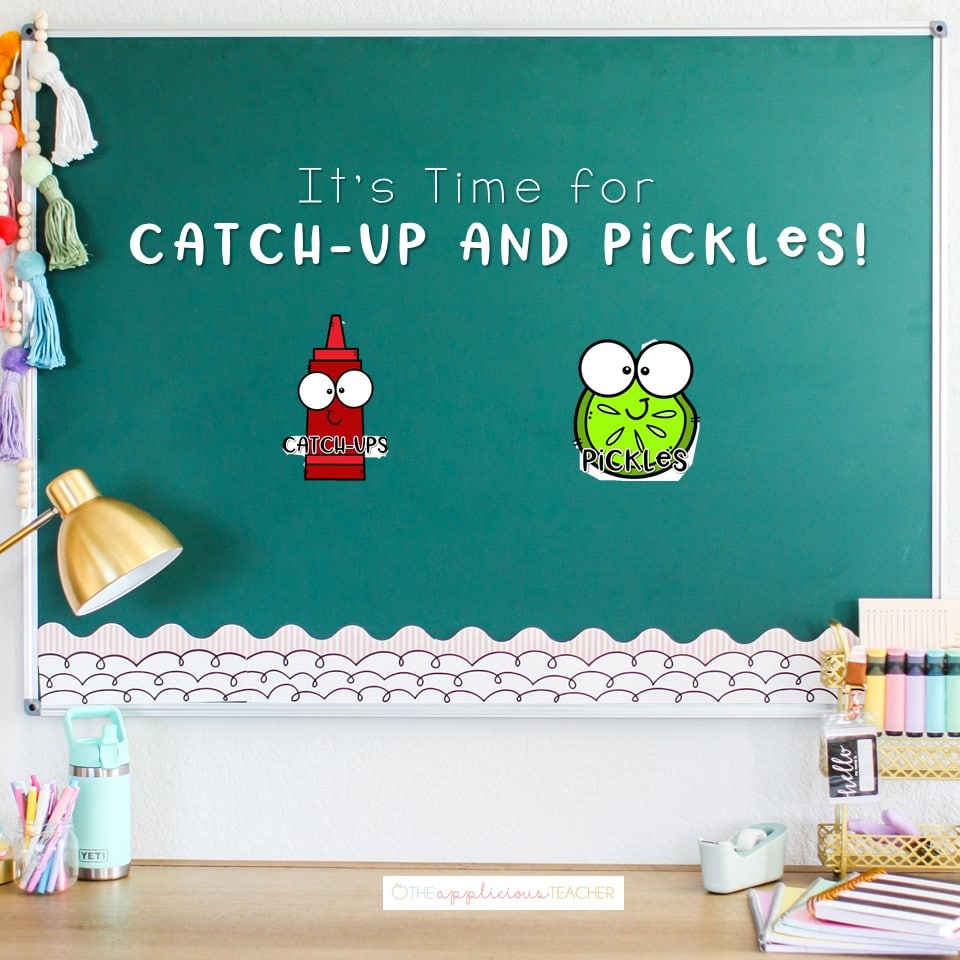
Whatever you decide, be specific. The unstructured nature of this routine means that chaos could happen at any minute. Being clear on what students should be working on at this time (and reinforcing it each time you have a Catch-up and Pickles session) can help keep the crazies at bay.
Who is a Catch-Up and Who is a Pickle?
From there, you’ll need a system for knowing who is a “catch-up” and who is a “pickle.”
Right before we started, I’d scan my grade book for any missing assignments. Those students with missing work would go on my “catch up” list.
Another way I identified students was through their “Unfinished Work” folder. Any classwork that didn’t get completed went in there (not tests or quizzes, just classwork). Right before we’d begin, students would pull out their folders and check to make sure there wasn’t any work that needed to be completed. If there was, they were on the “catch-up” list.
Let me just say, just even having an “Unfinished Work” folder helped a great deal with handling incomplete work! It was much easier for students to keep track of their work. If they finished an assignment early, they could either grab a book to read or work on unfinished work from their folder. The finished work folder lived in their desk, and I always told them, “If you aren’t done, put it in your finished work folder!”
You can read more about the unfinished work folder here !
I kept this routine real simple, guys! No fancy slide shows…just a whiteboard and names. In one column, I’d write “catch-up” with the students’ names and a list of work they needed to complete. In the other column, I’d write “Pickles” with the names of students who had completed all their work. When a student completed assignments and turned them in, they could erase their name and put it under the “pickles” side instead.
Activity Idea for Pickles
Now, remember, the name of any student who had completed all their work or their I-Ready minutes would be placed in the Pickles column.
My students loved being a pickle! They loved the idea of choosing their own activities (even if they were reading-based).
Some activities my students could pick from:
- Writing and illustrating stories – Pretty popular! Especially the illustrating. I showed students how to make a mini-book with lined paper folded and stapled together.
- Playing an educational computer game – Probably the most popular!
- Creating or playing on the IPad – Don’t worry, I was very clear about which apps they could use during this time!
- Completing a reading center game – Students could do this with their friends. I’d put any stations we had completed that week in an area towards the back of the classroom, and students could grab one to play. This also worked well for any student who needed to complete a station activity for their “catch-up” activity. Need reading center ideas? These were always a hit !
- Free choice reading – They could choose their own book and where they’d like to sit and read. They could also read with a buddy.
- Helping a friend complete their work – This one was pretty popular! I allowed it as long as they weren’t just telling their buddies the answers. Honestly, it was a win-win: The student got help, and the student helping was learning more! Bonus- it freed me up to complete DRAs, fluency checks, or reteach skills as needed.
- Teacher assistant – Sometimes I needed help, so if they were done and didn’t want to do one of the other activities, I’d put them to work, helping to organize papers or filling the mailboxes with returned work.
Unfinished Work Routine- Catch-up and Pickles
So there you have it, teacher friends. This is the simple, routine way I kept my students on top of their work. I mean, what teacher wants to feel like they are constantly chasing students around trying to get them to finish their work? NOT ME! Now you don’t have to!
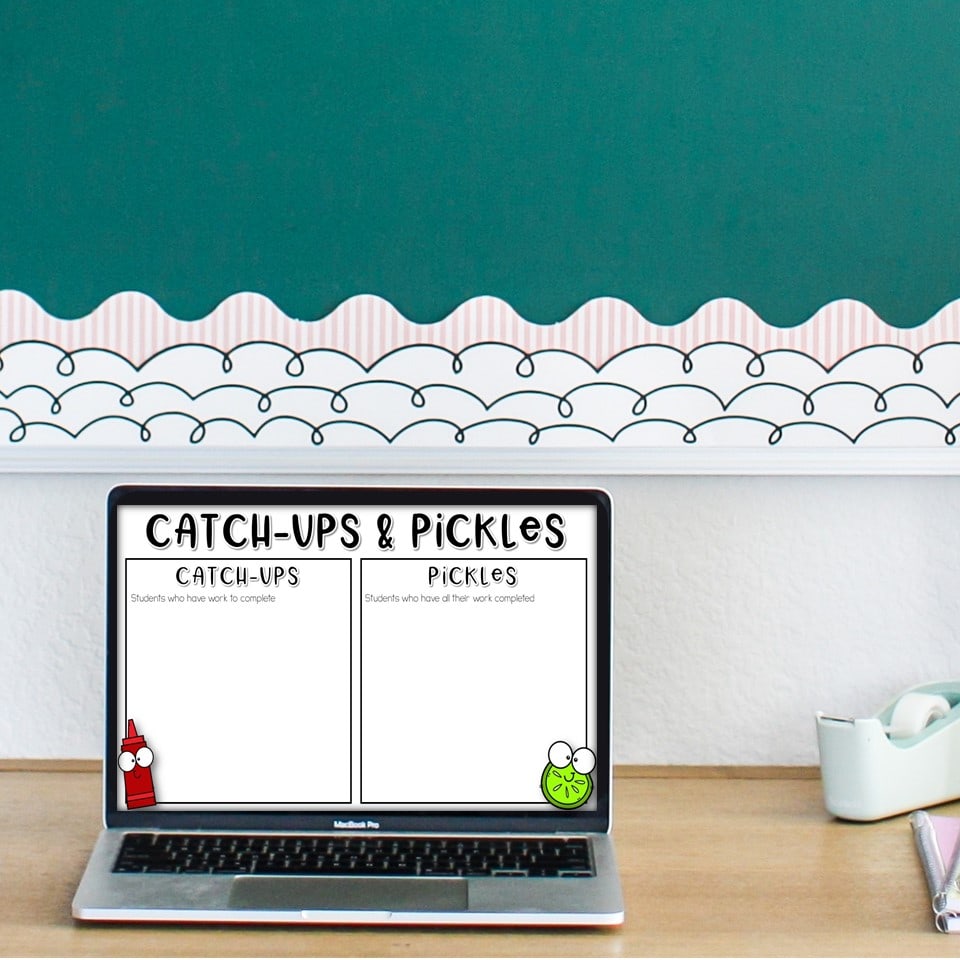
Free Catch Up and Pickles Download
Want to grab a few resources to help you get started? Click below and have this resource sent straight to your inbox! Now you can easily implement a Catch-up and Pickles routine in your classroom this week! This free download includes printable tracking sheets, whiteboard labels, and an editable PowerPoint file.

More Great Ideas!
Check out these other great ideas to try in your classroom!
- 5 Tips for Dealing with a Chatty Class
- How to Organize Your Google Classroom for 2nd Grade
- Help Students Take Ownership of Their Learning without a Data Notebook
- End of the Year Survival Tips
- Categories: Classroom , Classroom management

Hi, I'm Leigh.
The Applicious Teacher is all about creating hands-on and engaging lessons that align with the standards while still having time for your life. This is your place for ideas, tips, and resources for the REAL teacher!

Recent Posts
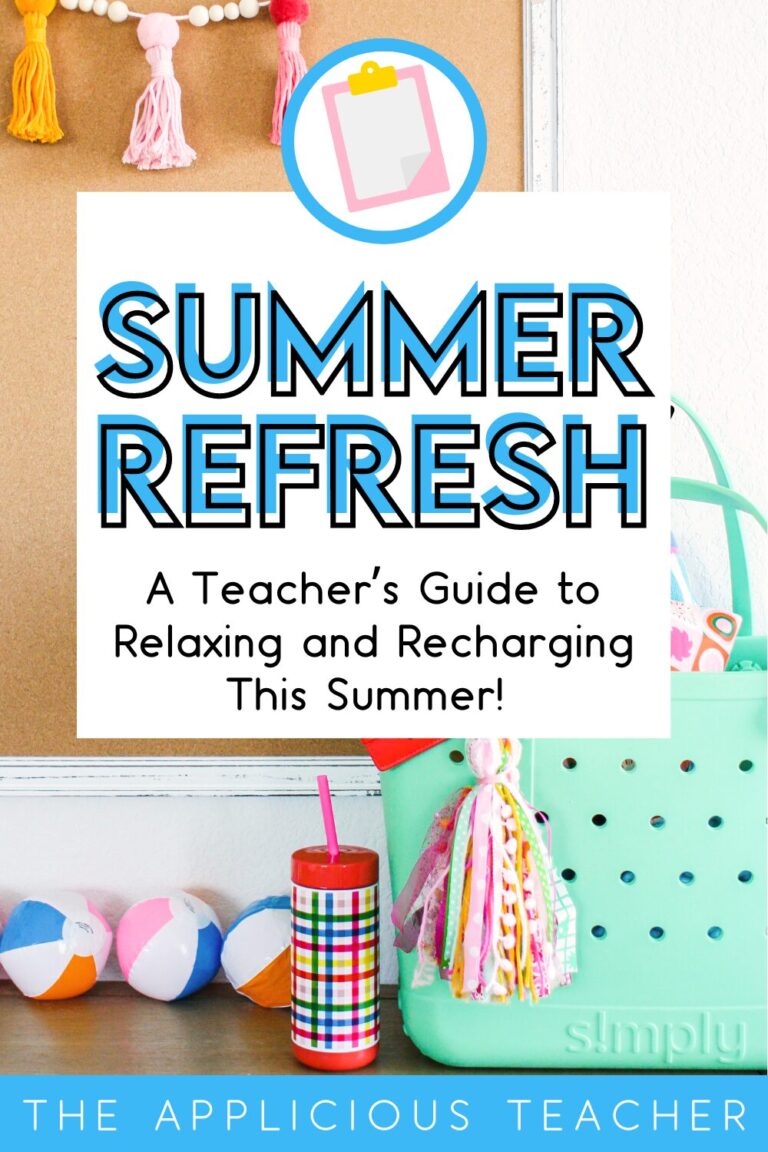
Popular in the Store
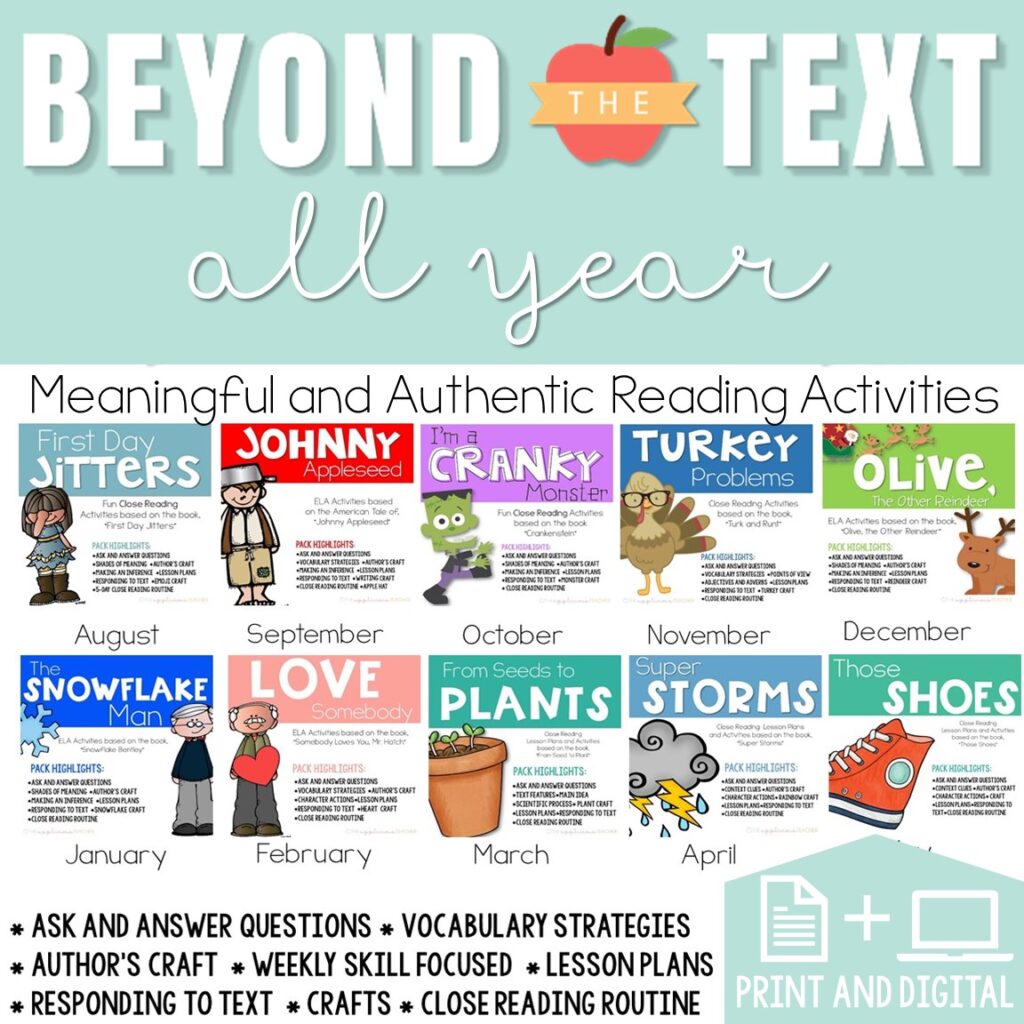
You may also enjoy...
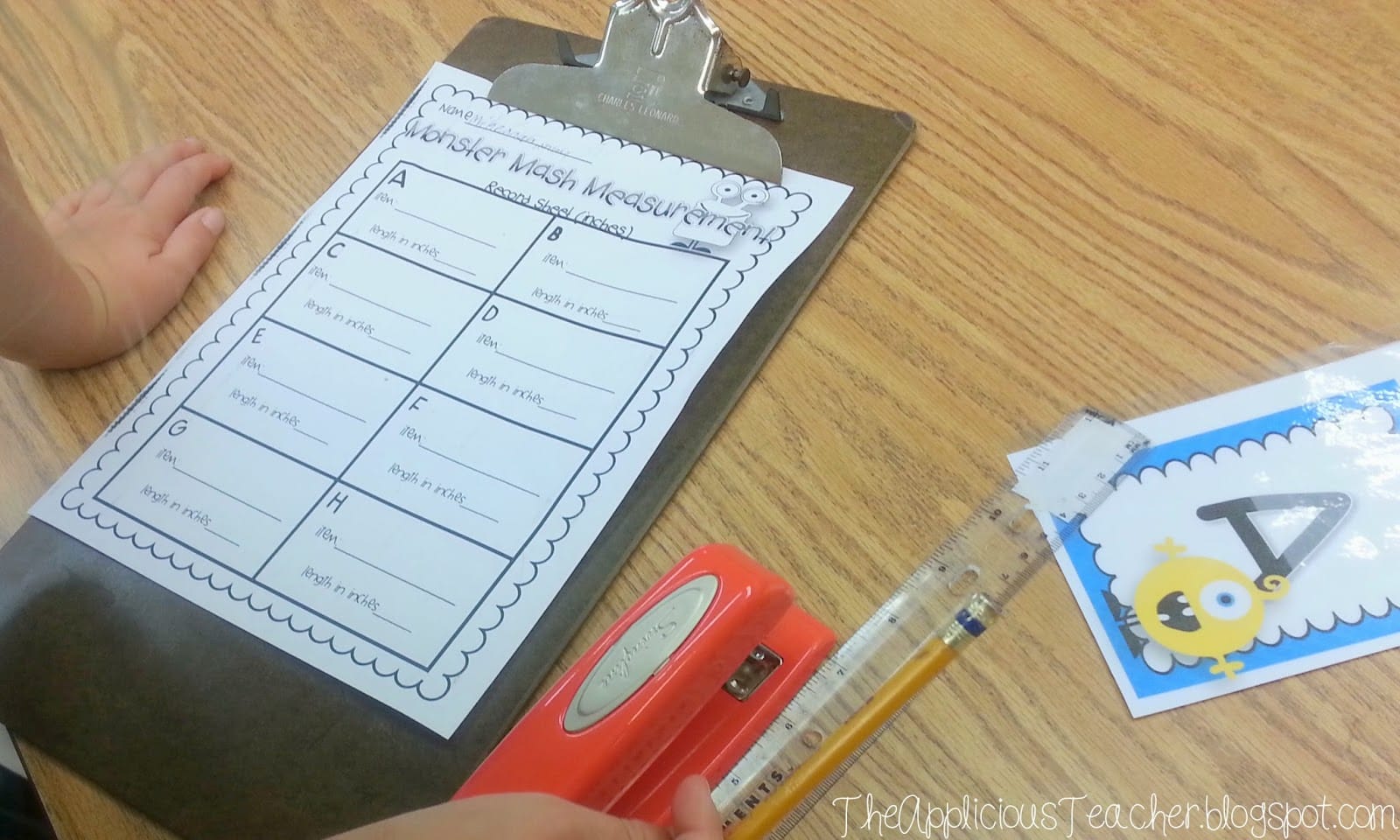
Monster Mash Measurement!
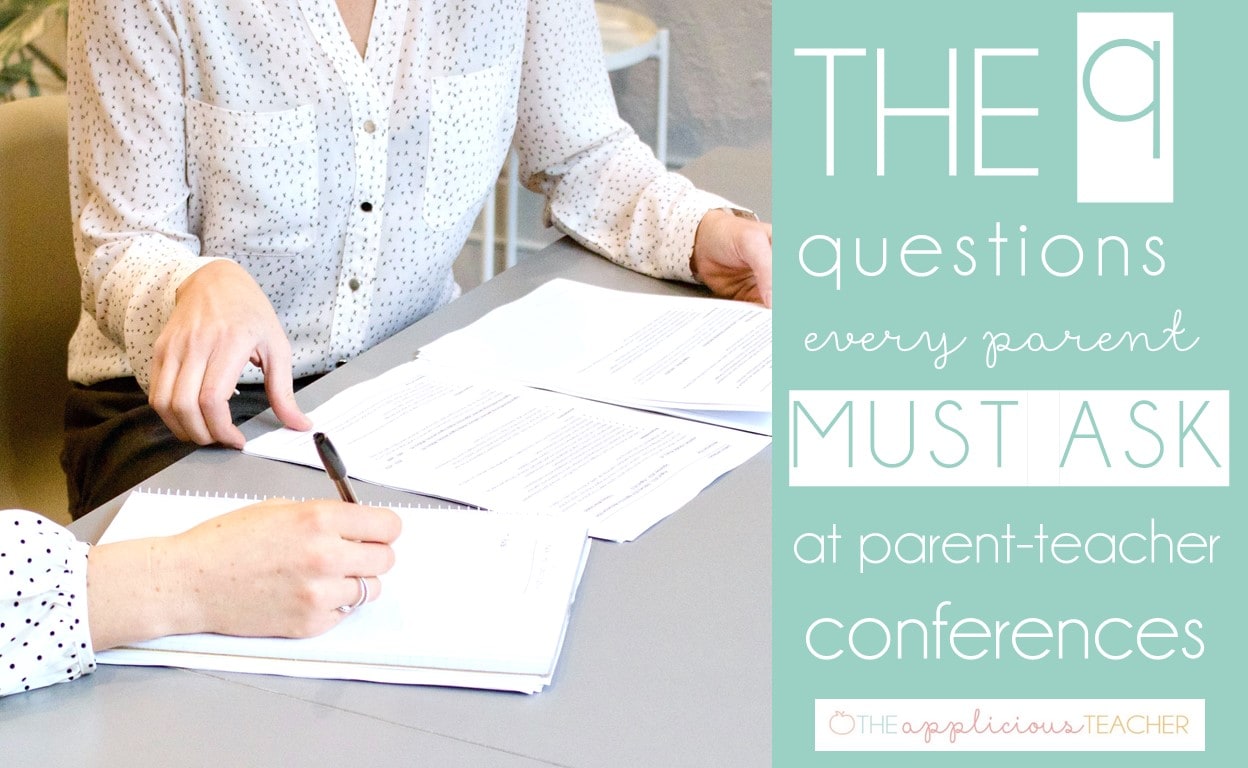
9 Questions Parents MUST ASK at Parent Teacher Conferences

5 Things to Do Over the Summer to Make Next Year AWESOME!

Math Center Tubs- Small Instruction for Math Time
© 2021 The Applicious Teacher. All Rights Reserved
Designed by Ashley Hughes
Use of Cookies
Privacy overview.
| Cookie | Duration | Description |
|---|---|---|
| cookielawinfo-checbox-analytics | 11 months | This cookie is set by GDPR Cookie Consent plugin. The cookie is used to store the user consent for the cookies in the category "Analytics". |
| cookielawinfo-checbox-functional | 11 months | The cookie is set by GDPR cookie consent to record the user consent for the cookies in the category "Functional". |
| cookielawinfo-checbox-others | 11 months | This cookie is set by GDPR Cookie Consent plugin. The cookie is used to store the user consent for the cookies in the category "Other. |
| cookielawinfo-checkbox-necessary | 11 months | This cookie is set by GDPR Cookie Consent plugin. The cookies is used to store the user consent for the cookies in the category "Necessary". |
| cookielawinfo-checkbox-performance | 11 months | This cookie is set by GDPR Cookie Consent plugin. The cookie is used to store the user consent for the cookies in the category "Performance". |
| viewed_cookie_policy | 11 months | The cookie is set by the GDPR Cookie Consent plugin and is used to store whether or not user has consented to the use of cookies. It does not store any personal data. |
The Pathway 2 Success
Solutions for Social Emotional Learning & Executive Functioning
40+ Strategies and Supports for Students Who Are Failing Class
October 17, 2023 by pathway2success Leave a Comment

Sometimes, kids and teens struggle in keeping their grades up. With enough struggle, students can end up failing a class (or just be in danger of failing). This can be for a multitude of reasons from being absent too many times to not understanding the concepts to not turning in assignments. Regardless of the reasons, when kids and teens are failing a class, it’s a big problem. The good news is that there are strategies and interventions to help kid and teens get back on track.
We all play a role. An important note to mention about this article is that I have divided it up into three sections of strategies. These are strategies for the student, the educators, and the parents. There are so many strategies that they could be split up into three separate articles, but I purposefully kept them together. That’s because while it is ultimately up to a student to do the work required to pass a class, we all play a role in setting the stage, providing supports, and helping them get back on track. We’re in this together.

One more idea to keep in mind is that kids who are failing might feel like they are too far down the road to make their way back to a passing grade. Sometimes, it can feel hopeless for them. They need to know that adults are there to help them and that they can use strategies to help themselves too.
EDUCATOR STRATEGIES
Consider the underlying reason why a student might be failing. There are many reasons why a student might be failing a class. Finding the underlying reason can help get to the root of the problem. Is the student refusing to do work because they are struggling with some personal challenges? Is the student having trouble keeping ahead because they are juggling too many after school activities? Is the student not preparing enough for tests and quizzes? Sometimes, this isn’t always easy to find out, but it’s worth investigating.
Collaborate with other educators. Talk with other educators and compare how the student is doing in other classes. Is the student failing in just one class or across the board? Understanding this can set the stage for next steps.
Provide encouragement. Remind the student that they can improve their situation with hard work and strategies. It’s important to keep a supportive mindset with the student, since the goal is to empower them to make better choices.

Meet privately with the student. Talking 1:1 with the student in a private setting can have an impact. If possible, meet privately with the student by calling them out of study hall or homeroom for a short session. Use this time to identify the problem, discuss, and come up with potential strategies together. It’s important be open to listening to the student’s perspective. Sometimes, the problems and solutions they list can be extremely helpful information.
Provide a list of missing work. After talking with the student, provide a concrete list of assignments they can make up for full or partial credit. Creating a missing work list serves for a few different purposes. For one, it lets the student know exactly what they can do to get started improving their grade. Also, the list can be mailed home and sent to administration for record-keeping at the same time.
Teach executive functioning skills. So often, students are expected to plan, stay organized, manage their time and work through challenges. When students struggle with these skills, it greatly impacts their ability to perform well in classes. The good news is that young adults can learn and apply meaningful strategies to help them. Use lessons and activities to teach executive functioning skills to give students the foundational skills they need.

Involve school administrators. When a student is in danger of failing, it’s important to be open and share this early on with school administrators. This is for a few reasons. First, the administrator can step in and contact families to provide an extra layer of support and reminders. Also, it’s important for the administrator to know early on that you are implementing strategies and supports. There should be no surprises about a student failing a class, which is why it helps to involve admin early on.
Give a study hall check-in. Stop into the student’s study hall or resource room to give an extra check-in. Sometimes, a study hall time for kids can be overwhelming; they have so much work and they’re not sure exactly where to start. When you give a check in, be specific about what work they can do in that moment to help get back on the right track. The goal is to help them get started and then allow them to complete it independently. This also helps model healthy work habits.

Teach SEL skills directly. Many social-emotional skills are actually a prerequisite to success in the classroom. These include skills like working with others, managing emotions, problem-solving, and persevering through challenges. Consider teaching social-emotional skills to your student (or whole class) to provide a foundation of support.
Consider learning challenges and needs. It’s important to consider if a student may have learning challenges that may have gone previously unnoticed. How are the students’ reading, math, and writing skills? Do they need interventions and tutoring in school? Do you suspect the student has a learning disability? If so, these are important questions to bring up and discuss with your school team.
Provide a daily check-in. A quick check-in with a student can help them feel connected while also building accountability. Every student check-in might be a little different depending on what that student needs; some students might need an emotion check in while others might need a check of their homework log. Some students might need both to help them do and feel their best. This check-in can be implemented by many different educators depending on what works in schedules, from a school counselor, classroom teacher, or paraeducator.

Consider social-emotional challenges and needs. Consider if the student has unmet social-emotional needs. It goes without saying that sometimes social-emotional challenges can impact academic challenges in a huge way. Touch base with your school counselor or school social worker to discuss supports that can be given, such as a group or individual counseling time.
Continue building a relationship. Many times, kids and teens need to feel connected to fully open up about their challenges. Continue focusing on relationship-building strategies . This isn’t a quick-fix but it’s a necessary support along the way.
Build motivation together. When conferencing or meeting with your student, discuss what it means to be motivated. Brainstorm strategies to build motivation together. You can even use motivation workbook activities to help build strategies for getting started, staying focused, and meeting goals.

Contact families. Work with families early on to let them know their child is struggling. Sometimes, these conversations can be uncomfortable, so it’s important to be open, honest, and supportive.
Build organization skills. Being disorganized can severely impact a student’s success in the classroom. If this is an area of need for your student, consider giving extra support specifically with organization skills. This includes teaching how to use a planner, keeping binders in order, and having the right materials each day. If this isn’t something that can be directly taught during class time, it might be worth reaching out to the school counselor or school tutor to see if they can work on some of these skills with your student.

Encourage healthy homework habits to families. From setting up a homework spot to keeping electronics away, encourage some homework habits for success that can help your student.
Schedule a family conference. A face-to-face conference with families and the student themselves is important. This sets the tone that extra supports are needed. It may help to ask an administrator to be present at the meeting too. One important note here is that the student should join the meeting too.
Develop a guided study hall. A study hall is often unstructured independent time to work. While this is great for self-starting students, it can be a struggle for those who need more direction. Consider implementing a guided study hall. This time is a more structured small group of students who need extra support. It should be run by a teacher or paraeducator who can give extra reminders and strategies along the way. For example, a 7th grade guided study hall might have a list of today’s homework up on the board. That teacher can get kids started on an assignment and provide academic support, as needed.

Develop a contract with the student. A contract very clearly spells out all the expectations for the student. Outline what the student is responsible for. For example, you might write in that the student will complete daily homework each night and will review grades with their homeroom teacher on Friday. Add in other interventions from the school. Then, have all parties sign the contract.
Teach study skills. Some students do not know how to study for tests, write down homework, or prioritize their work. These are skills that are essential for success in the classroom. Use strategies to teach study skills to help students do their best.

Try peer tutoring. Peer tutoring is a research-based practice that can teach both the tutor and the student they are teaching. If your school doesn’t currently support peer tutoring, it is something to be creative with and consider. For example, your peer tutor could earn extra credit for helping during study hall.
Consider extra credit opportunities. Sometimes, extra credit can be a helpful option. Such assignments can serve to help a student improve their grade, boost confidence, and teach meaningful skills. Ultimately, this is a decision up to every individual teacher to decide what works best for them and their learners.
STUDENT STRATEGIES
Start with a growth mindset. A growth mindset means knowing that you can improve your skills with hard work and dedication. At first, failing a class might feel like an impossible-to-fix situation, but it’s often not. You can learn and implement strategies to help yourself make better choices and improve your grades.
Check your grades. Being aware is one of the first steps to helping you get back on track. Review your grades to figure out where you currently stand. You can write these down to chart them over time.
Talk to your teacher. Show responsibility by asking to meet with your teacher to work on your grade. Use this time to talk about your current grade and ask for suggestions on how to improve it. It also helps to come prepared with your own suggestions to show you truly want to improve.
Plan a dedicated daily homework time. Habits make it all happen. Start with a dedication daily time to work on homework assignments and study for assessments. Some students might do best working right away after school is over. Others might work best an hour after they get home to help them unwind from the day. Choose what works for you and stick with it.

Make a goal for yourself. Setting goals helps us accomplish tasks. Consider a measurable goal that you want to meet, such as getting a 70% or higher in math by the end of the quarter. Then, list out steps to get there. Check back in with your goal each week to make sure you’re on track. Consider meeting with an adult at home or at school to help you with writing this goal, if needed.
Keep up with current work. From this point forward, make sure you are staying on track with current assignments. Missing more work will set you further behind, so it’s important to stay up-to-date.
Make a missing assignment list. First, check to make sure your teacher will accept late work. Then, make a list of all the assignments you can turn in for credit. Try to not get overwhelmed with the amount of work if you have many missing assignments. Just get started on a few and turn those in to get some momentum.
Get organized. Being organized can help you accomplish tasks. Spend time tidying up your binders, backpack, and workspace. Then, tackle them on a regular basis to stay organized.
Use a homework log. Use a daily homework journal to record assignments. Some students prefer a paper notebook while others do well with a digital app. Find what works for you! Whatever you choose, make it a habit and consistently write in your assignments.
Participate in class. Make an effort to stay engaged in classroom learning by participating. One way to do this is to take notes while the teacher is teaching. These notes can help you later on when you need to study or review. Another strategy is to raise your hand to answer questions and share ideas. These strategies will help show your teacher that you are invested in learning.

Study with a friend. For whatever class you are struggling in, find a friend who can study with you.
Talk with a school counselor. A school counselor can help you with many things, from personal challenges you’re going through to making a plan to talk to a teacher about your grade. Consider signing up for time with your school counselor to work through some of those needs.
Ask for extra help. Asking for help is a strength! Consider reaching out to the classroom teacher and seeing if there is any extra help available. Be willing to stay after, come during your study hall, or even visit during lunch if that is what is needed.

Know when to put distractions away. This is a tough subject, but an important one! Phones and other digital devices can be extremely distraction during work and learning sessions. Know when you need to put them away to help you focus and accomplish tasks.
Be open to learn new study strategies. If you struggle with tests and quizzes, be open-minded to try new study strategies. Consider quizzing a friend back-and-forth with questions. Make flash cards. Make a mock test and quiz yourself with it. There are many different study strategies and habits to try.

Find an accountability partner. Ask a friend or trusted adult to help hold you accountable for doing your work and studying for tests. Just talking to someone about your progress and goals can help you develop greater self-awareness.
Get enough sleep. Getting enough sleep at night is important to help you doing and feeling your best. Consider coming up with a plan to get enough uninterrupted rest at night.
PARENT STRATEGIES
Provide encouragement. Be a positive force to help your child turn their grade around. Remember that your child may feel it is impossible to recover from their failing grade, making them want to give up entirely. Remind them that they can turn it around with support, strategies, and hard work.
Help your child cope with stress. Failing a class is a stressful situation for young adults. Sometimes, before we solve problems, we have to cope with the emotions first. Help your child build healthy coping strategies to manage stress with activities like deep breathing, listening to music, and mindful coloring.
Check grades together on a regular, planned basis. Checking through grades together helps holds students accountable. Plan a weekly time to review and stick with the schedule.

Create a dedicated work space. Set up an area where your child can complete their homework and studying each night. Set up some rules and expectations for the work space, such as no TV or cell phones while working at the space.
Check over the homework together. Before your child starts their homework , sit with them and review the homework for the night together. This provides an extra layer of accountability and structure.
Chat with the teacher directly. If a teacher hasn’t reached out to you personally, send an email or phone call to get in touch and discuss. Work together to come up with some actionable steps. If your child is continuing to fail, ask for an in-person meeting to discuss strategies.
Schedule consistent work session time. Habits make all the difference! Agree on a daily work session time each day for homework, studying, and organization. Then, put your plan in action.
Complete work together. Try sitting down with your child as they complete their work. Help them get organized and set up. Work through problems with them if needed.

Set a regular bed time. Sleep is incredibly important to helping kids and teens do their best. So often, young adults are chronically overtired. Set a nightly bed time and stick with it. This requires a lot of practice but is worth it!
Leave electronics away from bedrooms at night. Cell phones are distracting at all hours of the day, but especially during sleep hours. Your child needs uninterrupted sleep to perform their best during the day. Make it a nightly habit for everyone to leave their phones in a designated spot to charge before going to sleep for the night.
Learn about executive functioning skills. Read about executive functioning skills and how they play a critical role in learning.

Discuss consequences. Young adults need to be held accountable for their choices. Be up front with your child about consequences for not doing homework, getting to class on time, or finishing assignments in class. Then, make sure to follow through.
Plan incentives together. When needed, consider adding incentives for reaching goals. Try to gear incentives towards activities versus material items. For example, once your child meets a certain goal (all homework for a full week), you might allow them to go to the movies with a friend or choose the end of the week restaurant for dinner.
Create a contract. A written contract is a great way to keep all of the supports, strategies, consequences, and rewards all in one place. Write it out. Then, sign it together.
Celebrate successes. When your child shows improvement, celebrate together. This even means celebrating small wins, such as a better grade on a quiz or finishing homework for the week. Big progress starts with small steps and encouragement can go a long way.

Share this:

Leave a Reply Cancel reply
Your email address will not be published. Required fields are marked *
Save my name, email, and website in this browser for the next time I comment.
Find It Fast
- Privacy Policy
- Join Pathway 2 Success
- Social Emotional Learning Toolkit
- Self-Control Resources
pathway2success1
⭐ Kristina 💖 SEL & Executive Functioning 💻 Blogger at www.thepathway2success.com 👩🏫 Special Educator turned Curriculum Specialist Links here 👇


Missing assignments and what to do about them
- January 6, 2022
- Classroom Leadership , Growth , Missing assignments , Student Motivation
Have you ever looked at your grade book and been frustrated by the number of missing assignments? Zeros obviously have an adverse effect on student grades. To address this issue, there has been a lot of discussion about changing the way we grade or limiting the amount of homework given. These discussions should take place but I don’t want argue the pros and cons of those ideas. However, I do want to address the fact that we are ultimately concerned with students showing mastery. Missing work can make this challenging.
We (the adults) can adjust our thinking and strategies regarding missing work, however the constant truth is that mastery is the ultimate goal. For most students, it is going to be challenging for them to show mastery on assessments if they don’t complete the tasks and assignments that preceded the assessment. Why? Because there is a certain feedback loop that should take place between student and teacher before the student even attempts an assignment.
During my time in the classroom I did not find the magic bullet to solve the issue of students not turning in assignments. Zeros filled my gradebook with empty cells highlighted in yellow. However, I will share with you some things that helped me find some success in this area.

1. Talk to the student with the goal of problem solving
The problem ultimately is owned by the student. Keep this in mind and prevent yourself from burning out (I wish I learned this lesson earlier in my career). By listening to the student with the goal of helping them solve their problem, you are in position to offer valuable feedback. Feedback leads to potential adjustments that need to be made by the student. When students adjust based on feedback, they find opportunities.
2. Suggest a planner or digital organizer
Planning for the responsibilities and tasks that life will throw your way is a wise thing to do. Convincing students of this can be challenging. At the high school level, I have found it very difficult to get students to use a planner. I have had some success getting them to use apps. Currently, I use the To Do app by Microsoft and I highly recommend it. At the beginning of each day I sit down and type out all my goals (tasks) for the day. The ones that I complete, I make disappear and the ones I don’t can carry over to the next day.
3. Help the student discover their “Why”
My experience has taught me that students who don’t understand why they go to school tend to struggle keeping up with their school responsibilities. They may say the right thing regarding why they go to school but their missing work reveals something unspoken. You can help your students commit to excellence by helping them discover their “Why.” This revelation can lead to more motivation on the part of the student. Figuring out the “Why” can take some time but starting the conversation and helping the student begin that journey is very important. Here’s something that I would ask students to get started: What is it that you want to do in this world to make it better place for yourself and others?
4. Celebrate Progress
Sometimes, words of affirmation are what students needs to adopt habits that lead to work completion and submission. If you have a student how do used to accumulate a lot of missing work and is now making an attempt to change those habits, celebrate in a big way. Make sure the praise isn’t superficial, but identify specific things that you notice students doing differently. Praise tends to yield more of the desired behavior because students feel good when they receive it.
Missing work can be frustrating and can add extra tasks to your to do list. It can be especially frustrating if you aren’t getting support from parents or administration. Throughout it all, I encourage you to never give up. Remember that you can’t control the student and make them do the assignment, but you can help them problem solve why missing work is a challenge. Like all great teachers, we exhaust all of our tools, get some more and keep trying. You’ve got this.
Enjoying the content? Please consider partnering with us to spread the message with a donation via PayPal.
Please subscribe to our newsletter to sharpen your classroom leadership skills and get updates delivered straight to you.
- More Networks

How to Finish All Your Missing Assignments Fast; 8 Useful Tips
When you do not submit or complete assignments on time you are faced with the challenge of missing assignments. It can be hard to keep track of all your missing assignments when they pile up but don’t worry.
First, talk with your teachers about the assignments you failed to submit and ask for a deadline extension. Then, make a plan for how to handle your work, putting the most important tasks first. Take breaks, treat yourself, and keep a good attitude to get more done. It’s not easy to make up for the schoolwork you missed, but if you’re organized and have a plan, you’ll be better able to handle whatever comes your way.
It is a daunting situation, and without the right approach, you may end up not finishing your missing assignments which will affect your overall grade. Here are critical steps that can help you finish all your missing assignments fast.
1. Create a list of all missing assignments

When working on missing assignments, you are more likely to pick the easier assignment first and forget about the tough assignments. Making a list of all your assignments helps to make sure you complete all missing assignments.
List all the missing assignments that need to be done; even if you have to re-read notes, all these tasks must be included in the list. Tick off the tasks after completion to keep you motivated.
2. Create a detailed timetable

A timetable helps you plan your tasks. Assign all your missing assignments time. Schedule more time for the tough assignments. Remember you are on a deadline, so whatever time you estimate an activity might take, reduce it by at least 5 to 10 minutes. You have to be ruthless and, at the same time, realistic when coming up with a timetable.
3. Gather all assignment materials
After listing all the missing assignments, you will have an idea of all the required materials. You must gather all the necessary tools, such as laptops and writing materials. By doing this, you ensure that you will not have to take breaks now and then to fetch something leading to time wastage. If you are the type of person who concentrates better on music in the background, this can be a great time to choose a studying playlist.
4. Switch off your devices
You must turn off all the gadgets not needed to do the assignments. These may include phones and tablets. You need to find a place with minimal distraction to enable you fully concentrate on the task at hand.
Being destructed will cost you time which could have been used to finish your missing assignments. Therefore, you can choose to keep your devices in a different room and only use them when you are on break. You can use one of the breaks already programmed to check on your social media.
5. Ask for Assignment help online
If you’re thinking “I need help with my missing assignments” and want to finish homework fast, don’t avoid getting help. There are fast writers online who will help you with your assignments – for a small price of course.
Remember that your mental health has a big effect on how much you get done. No matter how hard you try, you won’t be able to finish your assignment faster if you are tired or stressed out. Assignment help experts will relieve you of your missing assignments stress.
6. Reward yourself after finishing a missing assignment
Doing assignments may be challenging. Our brains work better when there is a possibility of getting a reward. Rewarding yourself after finishing each assignment will motivate you to continue and improve your speed.
These rewards can be a few minutes of rest, eating a snack, playing games, or spending some time on social media. These rewards should be manageable, they should not be activities that will take much of your time.
7. Avoid unnecessary breaks
Breaks are very important when doing any task, but you need to be disciplined and take breaks only when necessary to avoid wasting time. The best way to do this is by working in short sprints and taking at most a 5-minute break.
Remember, it is also not advisable to work continuously without a break. Your mind will be exhausted, and you will take longer to complete simple tasks.
To ensure you are disciplined, you need to have punishments in place if you don’t achieve your target. You can punish yourself by taking away break privileges when a task is not done as allocated.
8. Stay positive and remember what is at stake
Apart from following these steps, the most important step to finishing all your missing assignments is having a positive mindset. You must remember what is at stake, which in this case, is your academic achievement. Having this in mind will act as a form of motivational tool whenever things seem impossible.
Is it bad to have missing assignments in college?
Yes, it is bad to have incomplete assignments. You can skip some assignments without getting into trouble with the faculty, but you will lose some credits. Some lecturers are lenient and will award you partial credit for late submission of assignments, while others will give you nothing. When you miss assignments and are in an upper-division class, be sure your grades will be negatively impacted. You may not get into trouble with the faculty for missing one or two assignments, but your grades might be affected in the long run.
Do missing assignments affect your GPA?
Yes, missing assignments do affect your GPA. Missing assignments are usually given low or 0 marks which negatively impacts the grade, which is not a good thing for the student. You must maintain a GPA of 2.8 and above to have a good academic transcript. To remain competitive with the higher percentile range of students, you must have a 3.2 and above GPA score.
Can a professor drop you from a class for missing assignments?
Generally, a professor cannot drop you from a class because of missing assignments. However, this will also depend on your institution and its policy regarding missing assignments. Some lecturers are usually lenient and will pardon you for missing a few assignments, while others are stricter.
If you have any concerns about missing assignments, it is important to talk to your lecturer and understand their expectations and policies regarding missing assignments. If you are interested in getting the best results, you can contact your professor with genuine reasons why you missed the assignments and they might agree to give you partial credit that will assist in boosting your final grade.
Can I complete all my missing assignments in a day?
Yes, you can complete all missing assignments in a day. However, it will depend on the type and quantity of assignments you have. In most cases, it will be better to ask for more time instead of producing sub-standard work because of time.
Completing all missing assignments in a day will also require you to devise a good plan and implement it. You will have to stay away from any disruptions that may hinder your progress. Prior planning and communication with your lecturer will help you avoid situations whereby you have to complete a number of missing assignments within a day. You can ask for assignment help online if overwhelmed by deadlines.
Do missing assignments show up on transcripts?
No, missing assignments do not appear in your transcript; they only reduce your grades. Unlike cheating, missing assignments only affect total grades; therefore, it is better to have unsubmitted assignments than receive an “F” because of cheating. The only issue you will have on your transcript due to missing assignments is your GPA.
Can you graduate with missing assignments?
No, you cannot pass a class with missing assignments; therefore, you cannot graduate with incomplete assignments. To complete a course, some different assignments and tasks need to be completed, and failure to complete assignments will greatly affect your overall score.
Therefore, it is critical for a student to ensure that all assignments are completed and preferably on time. However, depending on the institution, you can graduate if the missing assignment didn’t greatly affect your final score.

Can a professor fail you for missing one assignment?
Not really, missing assignments will only impact your grade, and the lecturer has nothing to do with it. Most lecturers deal with several students and do not have time to deal with a particular student’s missing assignment. It is the responsibility of a student to make sure that all the assignments are completed. However, there are lecturers teaching units with few students; such lecturers have the time to follow up on individual students’ missing assignments. You need to know that even the lecturers that follow up on missing assignments will still deduct credit for a late submission.
It is completely the student’s responsibility to ensure no missing assignments. Professors do not fail students because of missing assignments because missing an assignment does not necessarily mean the student is performing badly; it might be because the student had a legitimate reason for not doing that assignment.
- Expert writers in 68 disciplines
- 8.5/10 average satisfaction rate
- Timely delivery
- Money-back guarantee
- Plagiarism-free papers
- Free revisions
- 24/7 support
How to place an order?
Take a few steps to place an order on our site:
- Fill out the form and state the deadline.
- Calculate the price of your order and pay for it with your credit card.
- When the order is placed, we select a suitable writer to complete it based on your requirements.
- Stay in contact with the writer and discuss vital details of research.
- Download a preview of the research paper. Satisfied with the outcome? Press “Approve.”
Feel secure when using our service
It's important for every customer to feel safe. Thus, at WritersABC, we take care of your security.
Get assistance with placing your order. Clarify any questions about our services. Contact our support team. They are available 24\7.
Still thinking about where to hire experienced authors and how to boost your grades? Place your order on our website and get help with any paper you need. We’ll meet your expectations.
Order now Get a quote

- Remote/Hybrid Teaching , Technology in the Classroom
My Favorite Way to Manage Students’ Missing Work
For me, trying to manage students’ missing work used to be such a headache! It was so much work to keep my lists up-to-date and get current information to students.
I tried so many systems, and regardless of what I did, I found myself drowning in small sheets of paper. It took more time for me to track down missing assignments than it took for the students to complete the work.

I guess it took remote and hybrid teaching to help me finally get down an effective system.
First, I created a sheet in Google Sheets™ to record the assignments I assigned each day. Each week, I created a new tab and labeled it with the date. I checked off work once it was turned in, changed the box to red if the assignment was missing, and changed the box to blue if the assignment needed a second look.
Now that it was easy for me to see who completed a given assignment, who was missing it, and who needed a second look, I needed a system of communicating that with the students. I also wanted to make sure this information was available to parents.
Using Google Docs™ allowed this information to be easily shared
I created a separate Google Doc™ for each of my students with each of their names, brief instructions, and the list of what they were missing. Using the share button, I changed the permissions so that students, their parents/guardians, and support teachers were able to edit and view the document. This allowed everyone to have up-to-date information regarding students’ outstanding assignments.

So I didn’t have to go back into each missing work page to update as students completed their work, I allowed students editing access. They delete the assignments off their list after they complete them. A few students tried deleting their assignments off the list without completing them. For students who made this a repetitive habit, I changed the settings to comment only which allowed them to inform me what was finished without actually deleting their on-going list.
Initially, it did take a bit to set up each of my students’ pages. However, now that it is done, I can quickly update my students’ pages. I created a bookmark folder on my taskbar called Missing Work. Within that folder, I have each individual page. I just need to click on that folder to access the missing work pages. Compared to handwriting, erasing, searching, forgetting to update, and writing again that happened with my previous systems, Google Doc missing work pages are saving me tons of time.
Why I LOVE this system:
- Students are responsible for checking their missing work page and managing it themselves by deleting what they complete
- Parents have easy access to see if their child is missing work and help support him/her at home
- When I email parents about missing work, it is easy to reattach this page for the information
- Teaching assistants or other staff members can help support my students complete their work, too
- I don’t have to continually rewrite missing work notes
- All the information is in one place—say goodbye to little notes everywhere
- Students just need to click the hyperlink to find their assignments
Let me know if you try this system! I would love to hear about it.
Happy Teaching!
Julie from Llama with Class
Grab some freebies to help you manage students’ missing work with this system
You will need a Google account in order to get these freebies. Click each picture to force a copy to your Google Drive™

You might also like...
Student growth during the pandemic, find what you need, make every teaching moment count.


The Magic Solution to Missing Assignments

One my biggest struggles as a 5th grade teacher was getting kids to do their homework. I’m guessing you can relate! I was never a fan of loading kids up with homework, but I did expect them to complete whatever was assigned. Most of my homework was finishing classwork, returning a signed paper, or reading for 20 to 30 minutes. Yet precious minutes of class time were wasted every day while kids looked for missing assignments or worse, wasted my time trying to explain why they didn’t have it.
Then I discovered the magic solution to missing homework … Fun Friday! I can’t take credit for the idea, but I can tell you that it works! It was definitely the most effective system I’ve ever used for dealing with the problem of missing assignments.
How Fun Friday Works

Fun Friday is a weekly event that 3 or 4 teachers organize and implement together. On Friday afternoon, each teacher hosts one activity in his or her classroom for 30 minutes. One or two teachers take a group of students out to play or organize indoor recess activities. Another teacher hosts a free time in the classroom where students play board games, draw on the Smartboard, use iPads or play with a class pet. Sometimes a teacher will offer a special arts and crafts activity.
At least one teacher supervises a “study hall.”Students who have not completed all homework for the week attend the Study Hall and use that time to make up missing work. Each week teachers rotate activities so that all share the responsibilities equally.
If there aren’t 3 or 4 teachers at your school who want to participate in Fun Friday, you can implement the program with just two teachers. One will take students outside or provide indoor recess, and the other will split his or her room between a study hall and a quiet reading or game room.
Why Fun Friday Works
My students loved Fun Friday and looked forward to the chance to get together with friends in other classrooms. It was one of the few rewards that actually motivated them to complete every single assignment all week. I kept a homework chart where I checked off those who completed all assignments for the week, and I was pretty strict with my requirements for Fun Friday. If a student even had one missing or late assignment during the week, they went to Study Hall. If you think this is a bit extreme, let me say that after just a few weeks of implementing Fun Friday, most kids would earn it every week. I was amazed at the difference this program made and how much time it saved me from dealing with late and missing assignments.
Fun Friday Sign-up Freebie
One thing that helped make Fun Friday easy to implement was a sign up chart. Right after lunch on Friday, I allowed those who had completed all assignments to sign up for their preference of activities. I’ve created several variations for you to try that you can download here for free .
Convincing Administrators
Over the years I did have a few principals who needed to be convinced that the 30 minutes we devoted to Fun Friday were not wasted. My rationale was that we easily made up this time by not having to deal with missing and late assignments all week. Also, everyone, teachers and students alike, are downright brain-dead by the time Friday afternoon rolls around! Have you ever seriously tried to teach a lesson on a Friday afternoon? Trust me, it’s a wasted effort. You’ll just have to reteach it on Monday!
Do you implement a similar program in your classroom? Have you found it to be effective? If you haven’t tried it, I hope you’ll test it out. I believe you’ll discover the magic of Fun Friday, too!
Candler's Classroom Connections
- Growth Mindset
- Literature Circles
- Cooperative Learning

Subscribe to the Newsletter
Secondary Sparks
A Teaching Blog
How to Organize Student Absent Work and Missing Assignments
October 24, 2022 by Michelle Rudolph 1 Comment
It’s the dreaded question, “What did I miss while I was out?” For years, I was guilty of simply excusing assignments because I couldn’t keep up with the missing and absent work. But, I realized there were valuable assignments students were missing out on (or that they really needed to complete, like exams). After a while, I found a system to organize student absent work that wasn’t overwhelming or chaotic.
Create a Dedicated Space
You know what they say, “Out of sight, out of mind.” If you don’t have a dedicated area, in plain sight, in your classroom for missing and absent work, it’s going to be a struggle to keep up with.
Personally, I organize student absent work with a hanging file folder with pockets. I put the hanging folder on a dedicated wall in my classroom. I use these hanging folders from Amazon . Then, I labeled the folders according to class name.
You can also use the filing crates, a mailbox, or paper tray. Consider the system that will be easy for students and you. If the system doesn’t work for you, then you are less likely to keep up with it.

Teach the Routines
Of course, you can’t organize student absent work if students aren’t aware of the system. Ideally you want to teach this at the beginning of the year, but a mid-year change won’t hurt anyone. No matter what, stay consistent with the expectation you have set. If students know they can get away without using the system or turning in work, they will!
When setting expectations, make sure you explain where to find missing work, where to turn that missing work in, and the amount of times students have to complete the work. You might want to put this on a poster or paper and display near the absent work pick-up location.

Get Ahead…of Yourself
Teachers have an endless to-do list every day. Make organizing student absent work easy by preparing in advance. For example, you might print a few extra pages of an assignment to store in the missing work folder.
Then, when taking attendance or as students are working, jot down absent student names on the top of your extra worksheets. Then, slip those into the missing work folder. I have found putting a name on the page makes it much easier on students because there are less questions about what they need to complete.

Keep it Organized
No matter which system you choose, make sure to keep it organized! You can organize your folders by unit or topic, like “light waves” or “plate tectonics”. You can also organize it by month, week, or day.
Each six weeks or quarter, go back through your files and do a clean out. You can even assign a student helper for this task!
This system to organize student absent work has saved me so much time, energy, and has saved my sanity! It also keeps my students accountable for their own work, which is a huge win.
Need another way to keep students organized? Try using agenda slides!
[…] This area of my classroom has saved me a tremendous amount of time. I call it the absent wall. I hang file folder holders on the wall and add any extra copies of assignments there. Students who miss a day or lose something can just go up to the wall, find what they need and grab it. I have more information about how I manage work for absent students here. […]
Leave a Reply Cancel reply
Your email address will not be published. Required fields are marked *
Save my name, email, and website in this browser for the next time I comment.

Sign up for my newsletter for freebies, teaching tips, and updates.

- How You Can Help
- Ways We Give Back
17 Ways to Get Your Students to Actually Do Their Work
Ask a teacher what their biggest frustration is and you’ll hear a lot of answers, but there’s one frustration that is all too common: students who don’t do their work.
Now we all know students are going to miss an assignment here and there. Things happen. But when a student consistently doesn’t do their work, it produces big problems.
And when you have class where the majority of students don’t do most of their work – yikes! I’ve had a few classes like that and can totally commiserate about how frustrating it is to try to go over an assignment that only 5 of the 25 kids actually did.

A classroom culture that says “work doesn’t really need to get done” is not only frustration for us teachers – it’s devastating for the students. They can’t learn if they’re not engaged and active. And for those who are struggling, they’re only going to get farther and farther behind without practice.
But we’re not here to commiserate. We’re here to find some ideas – to try something new. And, yes, I know you might’ve already tried some of these ideas. But I’m encouraging you – don’t give up. Choose a few that resonate with you and try again. Our students need us to figure out what will work for them.
Oh and by the way, these ideas are not all mine – many of them came from a fascinating conversation in our Christian Teachers’ Lounge Facebook group . Thanks to all those who gave such great suggestions.
How to Get Kids to Actually Do Their Work
- Require the student to complete the assignment in your room during lunch. I know it’s tough to give up lunch, but let’s think about this: If you required students who didn’t finish their assignment to finish it in your room during lunch, do you think you’d have many missing assignments? You can also co-op with another teacher or two and take turns watching each others’ students. – Catelyn M.
- Use class dojo. Class Dojo is a fantastic behavior tracking system. Assign positive points for completed work and negative points for missing work. You can even set it up to notify parents of missing work. – Carlon P.
- Grade & return assignments quickly. If you’re just walking around & glancing at the work to see if it’s done, students get the impression that it doesn’t really matter – so why should they do it? Instead, collect homework/classwork and assign a quick grade. ( I explain how to do this quickly & fairly in this article here .) Turn it back to them within a day or two so that they get quick feedback and can see how doing (or not doing) assignments is affecting their grade. – Angie A. (By the way, this doesn’t mean you have to grade every single assignment. But students should know that any given assignment could be taken for a grade and that many of them are.)
- Over communicate. Post assignments clearly – in more than one place if possible (in the classroom and on your class website). Email parents to keep them in the loop. – Laurie O.
- Reduce or eliminate homework. If your students work well in the classroom but just don’t do their homework, this radical-sounding idea might be just the solution you’ve been seeking. The truth is that lots of homework is just busywork & there are normally ways to get everything done during class if you’re smart about your time management. There are lots options: you can turn some or all of it into classwork, replace assigned homework with pop quizzes, or flip your classroom . (I share a lot more thoughts about this idea in my article Why You Should Give Less Homework .)
- Talk about a growth mindset & goal setting. We can cajole, threaten, and nag. But ultimately it’s the students’ responsibility to do their work. So invest time in discussing growth mindset & helping them create their own goals for your class.
- Absolutely require major projects to be completed. Make the completion of major projects (such as papers, science projects, etc.) a requirement for passing the course. They don’t complete the project, they don’t pass the course & must attend summer school or retake it. A hard line like this puts the ball back in the student’s court & makes the choice pretty obvious. – Laurie O.
- Deduct points for late assignments. Deduct points every day an assignment is late.
- Offer a help session. Consider offering a help session before school, during lunch, after school, or during a study hall. This makes help available for students who needs it while also putting the responsibility on them to take advantage of this resource. If parents complain last minute about poor grades, it’s a clear answer: “Your student declined the extra help I offered.” – Lena K.
- Print out students’ grade reports & highlight zeros for missing assignments. Every few weeks, print out your students’ grade reports and for those with multiple missing assignments, highlight the zeros from missing work. Sometimes kids don’t realize how much those zeros are affecting their grade. – Angie A.(p.s. Just because students can see their grades online doesn’t mean they look at them. The good students – yes. But the ones who aren’t doing their homework might have no idea….)
- Post a missing work list. Require missing work to be finished & post a list of all missing assignments somewhere in your classroom. An alternate idea is to keep a computer document of all missing assignments & print copies to post/hand out.
- Encourage a strong work ethic. It’s doubtful this will change anything overnight, but use every chance you get to encourage a strong work ethic and to remind kids that the habits they’re creating now will translate into real life. This isn’t a time to lecture, but it is a time to inspire them and help them understand that their life will be a result of their choices and their hard work (or lack thereof).
- Offer creative incentives. Brittany D. suggested this fun idea: “When I taught middle school I used to offer each class bucks for doing different things. If I wanted their test scores to go up, I’d offer bucks to the class with the highest test average. If I wanted homework back, I’d offer bucks for that. At the end of each unit the class with the most bucks got to pick (within school appropriateness) the music that they listened to during independent work time. The top earning class also got to pick the music for the class with the least amount of bucks and they’d pick things like toddler tunes, opera, etc. I don’t know if that would work with high school, but my middle schoolers loved it.”
- Offer choices for assignment topics. Whenever possible, offer choices so the students are more invested in their decision. This can be as simple as offering two different options for the writing topic or as complex as a full assignment schedule. Giselle P. suggests, “Set up a schedule and assignment options in different categories. They have to earn a certain number of points in each category to earn their grade for the unit. Giving them power helps them to be more invested and then you are guiding and inspiring rather than punishing.”
- Use Remind101. Remind 101 allows you to text students through the system without exchanging any phone numbers. Texting your students early evening to remind them of assignments takes away the “I forgot” excuse. Reynolds B. said that her grades went from D’s to B’s when she implemented this system.
- Create the right atmosphere. As the teacher, you set the tone for your classroom. Don’t coddle your students, but teach them that if they do their work, they will succeed. If they don’t, they won’t. – Reynolds B.
- Develop a school-wide plan. If assignment completion is a problem throughout your school, discuss this with your administration and see if you can come up with some school-wide solutions. If the culture of the school is “we don’t really have to do our work,” then having all the teachers on the same page & making big changes together might be the fastest & most effective way to change that culture.
Thanks to everyone who shared an idea! What else would you add to the list?
What to Read Next
Meaningful End-of-Year Activities to Upgrade the Last Days of School
Diffusing Tense Situations in the Classroom with Pocket Phrases
Make Learning Memorable with Tech (and Without Overwhelm)
That so true
Should we not have our lunch period to ourselves, or must we give every moment of our day to our students? Several of your suggestions put the work on the teacher, not the student.
You totally have to figure out what works for you. For some teachers, it’s worth it to give up lunch occasionally to not have to deal with tracking down all the missing homework. To others, it’s more work than help. Depends on you & your situation.
I am NOT giving up my recess for anything! That is what i deserve!
goooooooooooooooooooooooooooooooooooooood thinking
I will not be giving up my lunch period!! That is MY time.
THATS RIGHT
You took your time and the teacher’s time during class by not finishing the work.
GREAT JOB COMING UP WITH THIS TEACHERS
I’ve found (for middle school) that making a schedule to help get the ones with missing assignments that are adding up really helps. Sometimes what the issue is, is that the kids have so much to do that it seems impossible. So, by chunking missing work, it makes the 10 things missing a lot more manageable for the student. Yeah, it’s a lot of work for the teacher if you have a ton of them, but I find that it really does help. And if you save them, you can email them to parents and show administrators if there’s any question about what you are doing.
As a teacher it’s your job to see that students succeed. If they don’t then you are not doing your job. Not all students learn the same, find out what their strengths are develop them. Cookie cutter does not work for all students.
HAHA!! Its a teachers job to provide an educational environment and assist students with their learning. If students do not take an active approach to learning, nobody will be able to make them finish assignments.
What ever happened to parents being involved in their own Childs education. With online grade books and parents being able to track their kids grades, you would think that there would be more students getting their assignments done. Teachers only have a limited time with a student each day or every other day, they can not control what happens the other 23 hours of the child’s day.
I agree one of my classes turn in most of their work and hw- the other many are failing due to I don’t care the district will pass me on anyway (which is true). I literally have tried all these and for about 10 students nothing works- parents are even at a loss
I think the student centered learning approach sounds great, but it doesn’t promote learning if your students are not motivated.
Are you a teacher?
goooooooooooooooooooood thinking
No giving up lunch for me! My lunch break is NOT earned, it’s deserved !
Great ideas! I would love to learn more about revisiting classroom management plan as I have been out sick and returning to my middle school classroom soon. Thanks a bunch!!
Session expired
Please log in again. The login page will open in a new tab. After logging in you can close it and return to this page.
- PRO Courses Guides New Tech Help Pro Expert Videos About wikiHow Pro Upgrade Sign In
- EDIT Edit this Article
- EXPLORE Tech Help Pro About Us Random Article Quizzes Request a New Article Community Dashboard This Or That Game Popular Categories Arts and Entertainment Artwork Books Movies Computers and Electronics Computers Phone Skills Technology Hacks Health Men's Health Mental Health Women's Health Relationships Dating Love Relationship Issues Hobbies and Crafts Crafts Drawing Games Education & Communication Communication Skills Personal Development Studying Personal Care and Style Fashion Hair Care Personal Hygiene Youth Personal Care School Stuff Dating All Categories Arts and Entertainment Finance and Business Home and Garden Relationship Quizzes Cars & Other Vehicles Food and Entertaining Personal Care and Style Sports and Fitness Computers and Electronics Health Pets and Animals Travel Education & Communication Hobbies and Crafts Philosophy and Religion Work World Family Life Holidays and Traditions Relationships Youth
- Browse Articles
- Learn Something New
- Quizzes Hot
- This Or That Game
- Train Your Brain
- Explore More
- Support wikiHow
- About wikiHow
- Log in / Sign up
- Education and Communications
- Study Skills
- Homework Skills
How to Get Your Homework Done Fast
Last Updated: May 6, 2024 Fact Checked
Staying Focused
Getting organized, staying motivated, expert q&a.
This article was co-authored by Jake Adams . Jake Adams is an academic tutor and the owner of Simplifi EDU, a Santa Monica, California based online tutoring business offering learning resources and online tutors for academic subjects K-College, SAT & ACT prep, and college admissions applications. With over 14 years of professional tutoring experience, Jake is dedicated to providing his clients the very best online tutoring experience and access to a network of excellent undergraduate and graduate-level tutors from top colleges all over the nation. Jake holds a BS in International Business and Marketing from Pepperdine University. There are 8 references cited in this article, which can be found at the bottom of the page. This article has been fact-checked, ensuring the accuracy of any cited facts and confirming the authority of its sources. This article has been viewed 1,154,637 times.
Doing homework can be both time-consuming and frustrating, and you probably want to do more with your free time than just homework. When you have a lot of work to do, it can be tough to work efficiently. By staying focused, organizing and planning, and motivating yourself, you can get your homework done in a timely manner and move onto more fun and exciting activities. But you should start with putting away all distractions such as your devices unless you need them.They are normally the main distraction. You should also work in a quiet place so you are not attempted to go and do something else. For example, you should not work near your TV because you will be tempted to go and watch it.

- Download website-blocking apps such as Freedom or SelfControl to stay focused while using your computer for homework. Some, such as the Chrome extension Strict Workflow, even have the added bonus of preventing you from cancelling the timer once it has started.

- If one subject or type of assignment is taking much more time than the others, you may want to ask for a little extra help in that area from your teacher or parent.
- If you get distracted or go off-task, don't make excuses for yourself. (e.g. "I won't be able to focus until I do this anyway." or "I'm sure it will only take a minute or two."

- Consider consolidating your multiple different subject folders and notebooks into one big binder separated by tab dividers. This way, all of your schoolwork will be in one place.

- Decide how much time you want to spend on your homework collectively.
- Make a list of all the different tasks you need to finish.
- Estimate how much time you’ll be able to spend on each task to finish your homework when you want to.
- Work straight through your list and cross tasks off as you go. [7] X Research source

- A ten page essay that’s due in a week that you haven’t started should be labeled an “A” or “B” while a short five question worksheet due in three days may be labeled a “C”.
- Make sure you don't wait until the last second to get assignments done.

- Try eating celery sticks and apple slices with peanut butter.

Supercharge Your Studying with this Expert Series

Reader Videos
- Wear something very comfortable while you work. Thanks Helpful 2 Not Helpful 0
- Make sure to hand in all assignments on time. Thanks Helpful 2 Not Helpful 0
- Try using a planner to help you remember the tasks that you need to complete. Thanks Helpful 1 Not Helpful 0
Tips from our Readers
- If you set a timer, it can motivate you to get your homework done more quickly. Be sure to take a 2-5 minute break in between. For example, if you're going to do an assignment that you expect to take 30 minutes, set a timer for 15 minutes. Take a 2-minute break when the timer goes off, then set your timer again for 15 minutes.
- It can be good to have friends over if they help motivate you and are interested in getting their homework done quickly as well. They might be a distraction at times but it can also be easier to work when there are people around you who are working too.
- If you drink something cold during your breaks it can help make you more alert so that you'll finish faster. It might also help to do it at night rather than during the day so you feel more time pressure.
- Try to get your homework done as much as you can in school. You could do it during a flex or study hall. If your teacher gives you time in class to work on it, use it.

- Take your time. If you rush through your homework and don’t try your best, you might end up getting a bad grade. Thanks Helpful 177 Not Helpful 19
You Might Also Like

- ↑ http://www.goodtherapy.org/blog/creating-ideal-homework-environment-for-kids-with-adhd-0913164
- ↑ http://info.achs.edu/blog/never-do-homework-in-bed-3-reasons-why
- ↑ https://childmind.org/article/strategies-to-make-homework-go-more-smoothly/
- ↑ https://learningcenter.unc.edu/tips-and-tools/take-charge-of-distractions/
- ↑ https://kidshealth.org/en/teens/homework.html
- ↑ https://kidshealth.org/en/parents/homework.html
- ↑ https://ofy.org/blog/homework-hacks-8-tips-get-done-faster/
- ↑ Jake Adams. Academic Tutor & Test Prep Specialist. Expert Interview. 20 May 2020.
About This Article

To get your homework done fast, work in a comfortable, well-lit area that doesn't have any distractions. Also, try setting a timer with however many minutes you want to finish your homework in so you can glance at it as you work and see if you're spending too much time on something. You can also make a to-do list before you get started so you don't waste any time figuring out what you need to be working on. To stay motivated, have a snack and some water nearby, and reward yourself with a fun activity once all your homework is done. To learn how to get organized so it's easier to do your homework, scroll down! Did this summary help you? Yes No
- Send fan mail to authors
Reader Success Stories
Caroline Dublinn
Dec 29, 2016
Did this article help you?

Hannah Britt
Feb 8, 2022
Aug 3, 2021
Jul 3, 2016
Jul 12, 2017

Featured Articles

Trending Articles

Watch Articles

- Terms of Use
- Privacy Policy
- Do Not Sell or Share My Info
- Not Selling Info
Get all the best how-tos!
Sign up for wikiHow's weekly email newsletter
- Student Life
How to Never Miss an Assignment Again
Never miss an assignment again.
That which you had been dreading has happened. You either completely forgot about an assignment that was due or wasn’t able to finish and turn it in on time. While missing an assignment is something most college students are bound to face in a certain point of their academic trajectory, it can be a very unpleasant experience which can result in several complications with your marks in a specific subject. The best thing would indeed be not having to go through it.
However, with so many things going on at the same time, so many tests to revise for and a ton of other assignments due as well, it may often seem like science-fiction to be able to have everything prepared on time. True, it may be difficult, but it’s not impossible. In this article, we will give you some useful tips to help you organize yourself better and, as we say in Spain, “not get caught by the bull”… again.
[Conquer Powerpoint Presentations In 10 Easy Steps]
[Public Speaking: Tips For A Good Oral Presentation]
Let’s state the most important thing first, and that is
Forgive yourself. Regardless of the circumstances why you weren’t able to hand in your assignment on time. Acknowledging you’ve made a mistake and that you need to correct it is the first step towards improvement. Come to terms with what has happened and then let go; after all, there’s no use in torturing yourself over what you could have done differently once you can’t do anything else about it.
[YouTube Channels: Top-10 Helpful Channels for College Students]
[7 Authentic Ways to Feel Stress-Free as a College Student]
Speak to your professor
If you weren’t able to complete your assignment because you or someone in your family have had a health-related problem, teachers are more likely to put themselves in your place and give you a chance to compensate for the mishap. Also, if you or one of your relatives have been ill, ask the doctor for a medical letter to show to your professor and prove that you’re not just making up an excuse.
[Emailing Professors: Do’s And Don’ts]
[10 Tricks To Help You Stay Motivated While Studying]
There’s (almost) nothing a good dialogue can’t solve
Even if you’ve missed your assignment deadline because you prioritized other things or simply because you procrastinated too much, talk to your lecturer if there’s anything else you could do in order not to fail the subject. Perhaps for this class, they’ll be taking the final exam’s marks more into account; or there are other assignments which would give you a good opportunity to make up for the incident. Keep in mind, however, that every professor is a world of their own. Just because Professor X told you that you could do a paper about tropical fish to compensate for the missed assignment doesn’t mean that Professor Y is willing to give you that chance. And furthermore, don’t try to have your way at all costs: if your professor says that there are no more opportunities, accept that no means no.
[How To Write Better Thesis Statement For Your Essays]
[Study Tips For Finals: Why Do You Need To Start Now]
Don’t let it happen again!
Whenever one of your professors proposes a new paper to turn in or a new project to present, take good note of it in your calendar or agenda so that you make sure not to forget about it and end up having the deadline catching up with you. Once you have the date in which your assignment is due in mind, you can start preparing it with enough anticipation.
[5 Things To Do Between Your College Classes]
[Things To Do On A Sunday For A More Productive Week]
Get to work!
Go to your college or local library and start gathering the materials necessary for completing your project/assignment: read books, look up information online, take notes, write up some drafts… Of course, you don’t need to work yourself to death in a matter of a few days, on the contrary: dedicate every day a little time to your task, even if it isn’t more than an hour. If you start gathering up information and writing a couple of paragraphs since the very first day, you’ll see how you’ll have it done in time!
[7 Day Plan to Stay Productive]
[5 Steps To Do Research In A Not Very Popular Area]
“I’m stuck?! Help, please!”
Is your assignment topic too complicated? You don’t even know where to start? Are you at a total loss? Don’t worry we all have been there. If you see yourself struggling with your assignment, you can always ask your professor your doubts or request for a tutorship. If you address them in a polite manner and they see you truly interested in your work, they won’t refuse. Another tip that always helps is regularly attending your lectures: more often than not, your professors may drop little hints about what they’re looking for in an assignment… or even in the final exam! You can also resort to asking around your circle of college friends for some solidarity between partners. Keep in mind that at least two heads think more than one!
[Conquer Time Management in College and Get Your Best Results]
[The Best Guide to Getting Straight A’s in Your Exams]
If you follow these tips, you’ll see how you won’t miss another assignment again during your college years. But even if missing an assignment is not a very nice experience, think that you’re also a human after all and that it is impossible not to make a single mistake every now and then. Furthermore, there is always a valuable lesson to be learned from our slip-ups.
Do you think there are any other pieces of advice that should be taken into account for not missing your assignments’ and projects’ deadlines? If so, feel welcome to share them with us in the comment section.
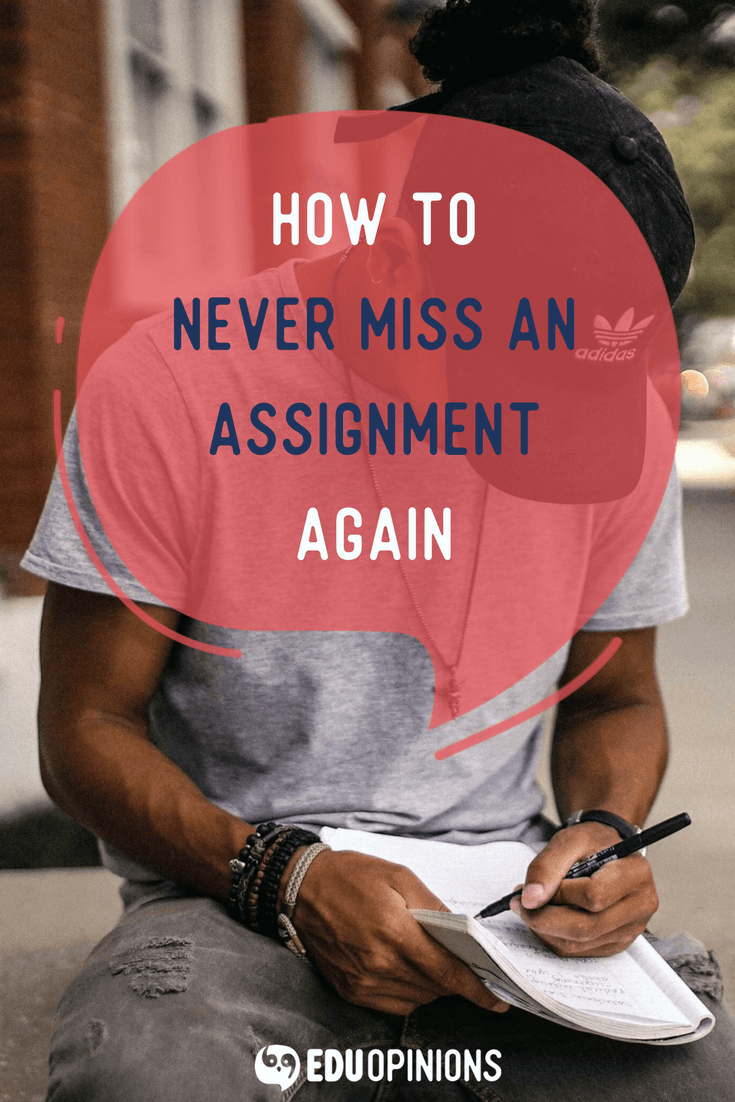
ESC Clermont Business School
Recent Posts

Universities in Germany are known for their practical approach to teaching, giving students the skills needed for future jobs. Plus, international ...

An MBA is a huge commitment, especially if you're not quite sure of the direction your career is headed in. In this case, choosing a fully ...

Studying abroad can be an exciting opportunity to expand your network, meet new people, and experience a different culture. It could also give you ...
- Universities
- Advice for Students
- Articles & Experiences
- Work with us
- For institutions
Receive more information immediately for free
Tips on How to Deal with Missing Assignments and Homework
- Kellie Hayden
- Categories : Classroom management tips & methodologies
- Tags : Teaching methods, tools & strategies
Tip Number 1 – Post Grades in Classroom
It sounds simple enough, but posting grades weekly allows students to see that they are indeed missing a few or many assignments. If using an electronic grade book, this is a very easy task. Some middle school and even high school students will complete the work and then forget to turn it in to the teacher.
If students are absent, some will forget to get the missing assignments. Posting grades allows students to check that they have everything turned in to the teacher.
It is best to organize the posting by student identification numbers and then list the grades from the highest grade to the lowest. This makes the grades not be in alphabetical order. This allows for anonymity when posting grades.
Tip Number 2 – Send Home Progress Reports at Midterm
At midterm, send home a progress reports to be signed by the parent. The progress report should list the grade, all the assignments and missing ones. If students do not bring back the report signed, then the teacher should call the parent.
Students immediately see their individual missing assignments. Also, this is a quick way to communicate with all of the parents. Many parents will write notes on the progress reports, call or email the teacher once the progress reports have been sent.
Tip Number 3 – Communicate with Parents
This tip probably goes without saying. However, in this busy world, it is difficult to find time to communicate with parents about missing assignments. Many parents do have email now, and it is my communication tool of choice.
Handouts, lists and progress reports can be sent via email these days. Some electronic grade books even post grades and missing assignments online. So, communicating with parents has now become somewhat easier.
Communication with the students and the parent are key to student success. If parents are unresponsive, check in the office about alternative ways of communicating with the parents. Many times students will become successful when teachers keep following up on missing assignments and show that they truly care about the student.
This post is part of the series: Classroom Mangagement Tips
These articles all center on ways to help a teacher develop classroom management skills. Tips range from behavior management to management of work and parents.
- Top Five Classroom Management Strategies – They Really Work
- How to Deal with Missing Assignments
- How to Deal with Angry Parents
- Student Data Platform
- - Data Dashboards
- - Data Warehousing
- - Data Integrations
- Advisory Services
- Strategic Decision-Making
- Progress Monitoring
- Family Engagement
- Public Dashboards
- Interactive Demo
- Why Schoolytics
- Resource Hub

A Better Way to Handle Missing Assignments

Published: November 04, 2022
In a perfect world, all students would submit their work on time. However, for a variety of reasons, this is rarely the case.
Google Classroom is great for allowing teachers to assign work and for students to submit work. As a classroom teacher, I enjoy the convenience of finding student work organized in Google Classroom rather than trying to manage a stack of papers for each assignment. However, I run into the challenge of providing a list of what a student still needs to complete.
Missing Assignments Report
Google Classroom lacks a missing assignments report. When a parent or guardian requests a list of what their student is missing, I cannot send the list from Classroom. In a particular class, I can go to the People tab and drill down to a student, filter for Missing Assignments and then copy and paste that information into an email.
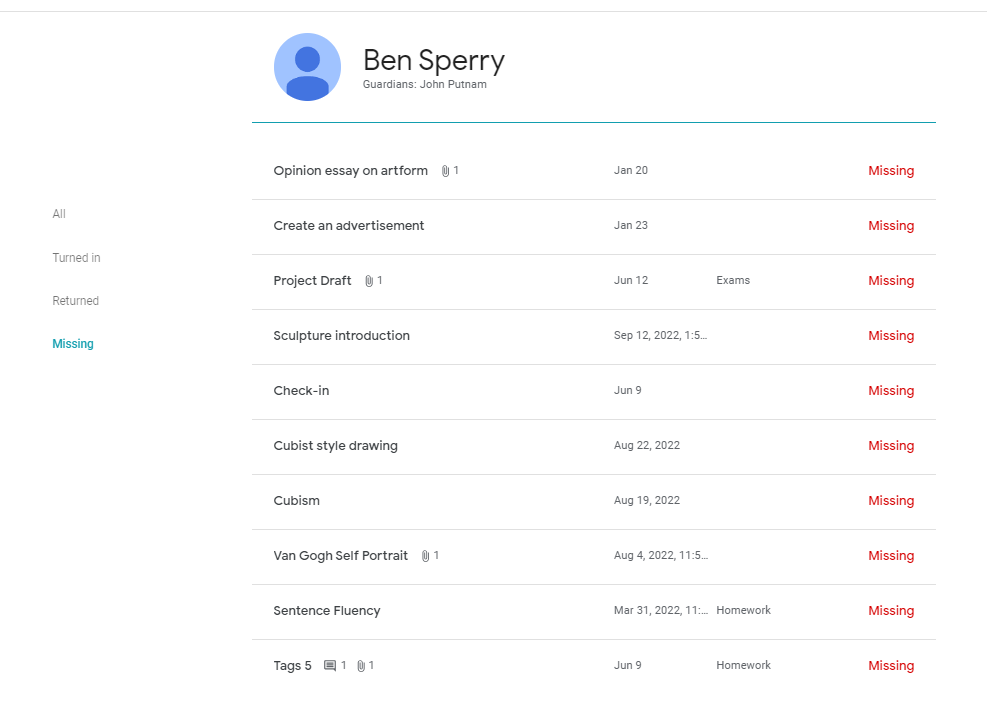
Customizable Missing Assignments Reports
Fortunately, there is a free and better way to share a list of missing assignments. Schoolytics allows teachers to sync their Google Classroom classes. After logging in, a “Missing Assignments” report is easily accessed.
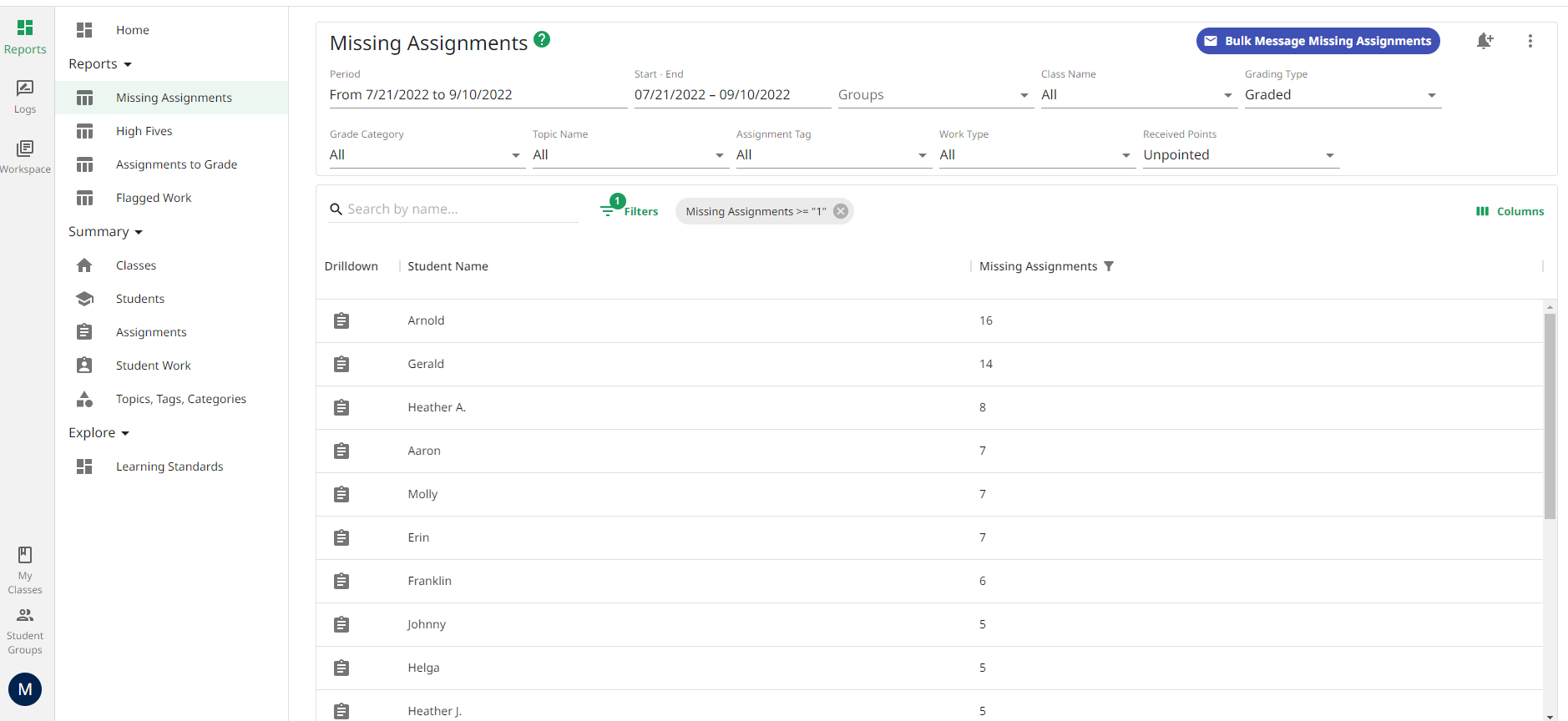
Create a Filter
Do you just want a list of what a student is missing this week? Or maybe just homework assignments that are missing? Schoolytics allows you to use the filter options at the top to customize the information you want to share. Change the date range from the default “Last 30 days” or filter for class or grading category.
Post to the Stream
If you want to communicate with students about their missing assignments, the Stream is a great option. When selecting to message student assignments the options are “Email” and “Stream.” Click on the Stream to send a list of live links that only the student can view. This shows up right in Google Classroom. The note, either for Email or the Stream, is customizable.
Share with Guardians
Use the 3 dots menu throughout the Schoolytics platform to export information to a Google Doc, Sheets or PDF. Selecting “Save to Drive” creates an editable and customizable missing assignments report that you can send to a parent or guardian. As a classroom teacher, I particularly love this feature since I have control over what information is being shared rather than a generic report that might generate more questions than it answers.
CC Guardians
A district-wide Schoolytics plan allows you to directly share missing assignments reports with parents and guardians. Under the email option, there is a checkbox to allow you to CC Guardians.
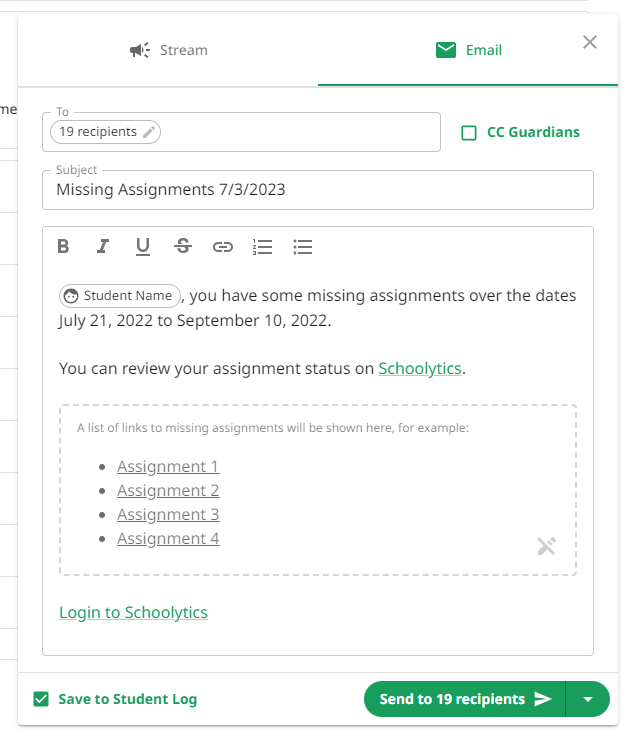
- Select the email option.
- Checkbox CC Guardians to send a list of missing assignments.
- Customize the email subject line.
- Customize the assignment message. The list of missing assignments will be dynamically generated for each student.
- Document that you notified students and their guardians of their missing assignments.
- Bulk send to students and guardians the report
Save Time with Schoolytics
I save hours of time each week by using Schoolytics to gain insights into student performance, quickly know which assignments have been submitted, and creating reports for better communication about student performance. Schoolytics is a tool that enhances my use of Google Classroom and saves me time.
About the Author
Alice Keeler is a teacher and author of the book “Stepping Up to Google Classroom.” Find her on Twitter @alicekeeler and on her blog, alicekeeler.com .
Related Articles
Tracking Missing Assignments For Students and Guardians

4 strategies to get those missing assignments turned in

Top LMS Reports for Administrators and Teachers

- Productivity Center
Never Miss an Assignment Again
Angela Ruth
- Business Tips
Wednesday, September 22nd, 2021

Everybody makes mistakes, but nobody wants to. Missing an assignment is a common mistake that we have all made at some point. While sometimes a solution can be as simple as pushing back the deadline, missing major assignments can cost you your job or a good grade in your classes.
Whether you’re struggling with school assignments, work projects, or balancing them both, this guide will help you never miss another assignment no matter what:
Write Down Everything
Start by writing absolutely everything you can about your project or assignment. Then, put every assignment due date into your Calendar with no exceptions. Even the smallest of deadlines are worth taking note of. You can use multiple calendars to spread out tasks by topic; just remember to have them all pulled into one Calendar — like the Calendar app, so you don’t miss a date.
Using an online Calendar means you can have access to your assignment list no matter where you are. Having direct access wherever you are will come in handy. Remember when you’ve had a paper due at midnight while you’re at a friend’s house and need to log on really quickly to upload your information? Your online Calendar will sync across all devices. You want to be able to check due dates on your smartphone as well as when you’re sitting at a computer.
If you like to physically write things down, go ahead! The action of writing things down can help improve memory , which is extremely important if you’re hoping to never miss an assignment again.
Give Yourself Plenty of Reminders
Even when everything is written down in your Calendar, there’s still a chance that you will forget an upcoming due date. However, a healthy dose of reminders ensures that not even the smallest detail gets overlooked over time. After all, a lot can happen between the day you write down as assignment due date and the day it actually arrives.
For example, you can set a reminder the day before an assignment is due for school to make sure that you have it completed. As you clock into work, a morning reminder will remind you of the tasks you need to complete by the end of your shift. These reminders force you to look at your Calendar after you fill it in initially.
Check Your Email to Start the Day
Last-minute changes happen, often due to circumstances out of your control. Even so, you should be aware of these changes so that you don’t get caught off guard. Checking your email at the beginning of each day should do the trick.
By starting your day off by scanning emails , you’ll be able to see the message your manager sent you at midnight notifying you that they expect your next assignment to be completed a day earlier. If you neglected to check your email in the middle of the night or at the start of your shift, you would be completely unaware of this change until it might be too late to do anything about it.
An email from your professor might contain a new assignment list for the following week. If you miss this email, you won’t be able to change up your Calendar in time to adjust your timetable and study schedule.
Communicate With Others
To avoid mishaps with upper management, make an effort to communicate often. Set clear expectations with your manager about how and when to communicate, so you’re not always getting the brunt of last-minute adjustments.
If your work gives you too many assignments, you’re more likely to miss a deadline or two due to the heavy workload. Your workload is another thing you can communicate with your superiors. If you don’t make it known that you’re feeling overwhelmed, nothing will change.
Communicating with coworkers and peers is also essential. We’ve all had a poor experience doing a group project where certain members of the group fail to pull their weight. Staying connected with them won’t be easy, but it will ensure that their feet-dragging won’t be the reason a project isn’t ready to submit on time. A reliable project member can also help you stay on top of deadlines as they arrive by sharing the responsibility.
Learn From Your Mistakes
Most of the time, when you miss an assignment, it’s because a mistake was made, even if only a small one. To stop missing assignments, learn from the mistakes you make to avoid repeating them. Over time, you’ll be a master of punctuality and completing deadlines.
Some mistakes we’ve already covered, in a sense. For example, failing to write down your due dates leaves a lot of room for error regarding late assignments. If this has happened to you, learn from your mistakes by vowing to write everything down from this point forward.
If you’re making an active effort to learn and improve, mistakes only need to happen once before you learn from them. For example, after putting a deadline on the wrong day in your Calendar once, you’ll be a lot more careful in the future.
Stop Procrastinating
Flexible due dates are the worst for chronic procrastinators. The due date will keep getting pushed back until its breaking point, and often ends up coming in late because of it. Staying on top of all your assignment means kicking procrastination to the curb .
If you have a problem with procrastinating, try to find a sense of urgency. Give yourself rewards for getting tasks done early. Use your Calendar to put together a work plan that ensures you’re chipping away at month-long projects. Do whatever it takes to avoid cramming in work at the last minute.
Don’t get too comfortable even when these tips start to show results. You need to stay on top of your game in order to meet all your deadlines with precision. You’ll be able to form better habits along the way but never let up, and you’ll never miss an assignment again.
Image Credit: ketut subiyanto; pexels; thank you!

- Entrepreneur
- Productivity
- Time Management

My name is Angela Ruth. I aim to help you learn how Calendar can help you manage your time, boost your productivity, and spend your days working on things that matter, both personally and professionally. Here's to improving all your calendars and becoming the person you are destined to become!
Related Stories

Privacy Overview
Pin it on pinterest.
Share this post with your friends!

IMAGES
VIDEO
COMMENTS
Check with your school administration to find out. 2. Communicate with your teacher after unexpected absences. Stay after class to talk with your teacher one-on-one, or head to their office during your free time. Explain the situation, let them know you're trying your best to catch up, and ask what you missed.
Choose short assignments, Or assignments in the classes that your child likes or finds easier than other classes. The point here is to allow your child to experience progress and success. If they see the plan working, then they are more likely to continue with the plan and have a better attitude about working on their missing assignments.
Here are 3 simple and repeatable tips to help classroom teachers encourage students to—finally—submit those late, missing, or forgotten assignments. 1. Help students manage their own assignment completion. There's no better way to promote accountability than to help students to keep track of and manage their own assignments list.
Showing students the difference it makes to turn in just a few assignments can increase their motivation to get the work done. Here's an example of the difference it can make to turn in just a few missing assignments before the end of the semester:
Evaluate and improve your SAT score. 3. Gather all your gear. Collect EVERYTHING you will need for the homework you are working on (like your laptop for writing assignments and pencils for problem sets). Getting up for supplies takes you off course and makes it that much harder to get back to your homework. 4.
Today, I'm sharing this simple yet HIGHLY effective routine that basically eliminated the struggle to get students to complete missing or incomplete assignments. This magical weekly routine that solves the missing work problem is fondly called, " Catch-up and Pickles. " But, that's really just a fancy name for a time set aside on a ...
Collecting & Updating Work That's Turned In: * Track daily what's turned in: Have a designated in-bin that is only for work that absent/late work. Go through that bin daily to update your gradebook & the missing work document/board. This does not mean it needs to be graded right away, just updated that it's been turned in.
Make a missing assignment list. First, check to make sure your teacher will accept late work. Then, make a list of all the assignments you can turn in for credit. Try to not get overwhelmed with the amount of work if you have many missing assignments. Just get started on a few and turn those in to get some momentum. Get organized.
4. Celebrate Progress. Sometimes, words of affirmation are what students needs to adopt habits that lead to work completion and submission. If you have a student how do used to accumulate a lot of missing work and is now making an attempt to change those habits, celebrate in a big way. Make sure the praise isn't superficial, but identify ...
Tracking Missing Assignments For Students and Guardians. As the end of the school year approaches, students need to get their missing assignments turned in. Not only does this help their overall grade—most class grades depend in part on assignment completion and grades—but completing more assignments helps students' comprehension as well.
2. Create a detailed timetable. A timetable helps you plan your tasks. Assign all your missing assignments time. Schedule more time for the tough assignments. Remember you are on a deadline, so whatever time you estimate an activity might take, reduce it by at least 5 to 10 minutes. You have to be ruthless and, at the same time, realistic when ...
Grab some freebies to help you manage students' missing work with this system. You will need a Google account in order to get these freebies. Click each picture to force a copy to your Google Drive™. Student Missing Work Page: Click Here. Class Tracking Sheet: Click Here.
Sometimes a teacher will offer a special arts and crafts activity. At least one teacher supervises a "study hall."Students who have not completed all homework for the week attend the Study Hall and use that time to make up missing work. Each week teachers rotate activities so that all share the responsibilities equally.
Make organizing student absent work easy by preparing in advance. For example, you might print a few extra pages of an assignment to store in the missing work folder. Then, when taking attendance or as students are working, jot down absent student names on the top of your extra worksheets. Then, slip those into the missing work folder.
Don't coddle your students, but teach them that if they do their work, they will succeed. If they don't, they won't. - Reynolds B. Develop a school-wide plan. If assignment completion is a problem throughout your school, discuss this with your administration and see if you can come up with some school-wide solutions.
Every 25 minutes or so, take about 5 minutes to stretch and walk around to give your brain and body a quick rest. [11] 2. Eat snacks and drink water. Drink plenty of water and eat light, healthy, tasty snacks while you work to enjoy foods that you like, enhance your memory, and revitalize your brain and body.
Let's state the most important thing first, and that is. Forgive yourself. Regardless of the circumstances why you weren't able to hand in your assignment on time. Acknowledging you've made a mistake and that you need to correct it is the first step towards improvement. Come to terms with what has happened and then let go; after all ...
Tip Number 1 - Post Grades in Classroom. It sounds simple enough, but posting grades weekly allows students to see that they are indeed missing a few or many assignments. If using an electronic grade book, this is a very easy task. Some middle school and even high school students will complete the work and then forget to turn it in to the ...
Select the email option. Checkbox CC Guardians to send a list of missing assignments. Customize the email subject line. Customize the assignment message. The list of missing assignments will be dynamically generated for each student. Document that you notified students and their guardians of their missing assignments.
Wednesday, September 22nd, 2021. Everybody makes mistakes, but nobody wants to. Missing an assignment is a common mistake that we have all made at some point. While sometimes a solution can be as simple as pushing back the deadline, missing major assignments can cost you your job or a good grade in your classes.
Get to work! After they're submitted, you can follow up and apologize for the late submission and say that you understand that there may be a penalty. Do not make excuses or give a long sob story, as this may cause your professor to view you unfavorably. Something short and professional, eg.
Focus on the assignments that are worth the most points first. i would say try and do them all in one go or at least half. start with the easy ones, play music just focus on taking it one assignment at a time. if you get a headache or feel tired take a 10 min break and eat something sweet that helps me.
Good idea. Some of these are going to take much longer than 25 minutes though. that's fine, you still need the break, even if you're returning to the same assignment. I have 14 missing assignments, let's get it! Thanks man, we can do it!